#like it's not a bad setup if it's then deconstructed in some way but it never is it's just 100% played straight
Explore tagged Tumblr posts
Note
I wish there were more ganon fans that just didn't make him into a misunderstood little meow meow and made him into a complex leader who can be right about his reasons but still have red flags and be selfish
I'm glad people have fun with him, especially given the flurry of attention he received recently, and I'm glad there's a wide breadth of content to enjoy. I do prefer that version you're describing here as well though! I call this reading of the character "Morally Dark Gray Ganondorf"; the kind that definitively has a point, whose whole psyche makes a twisted kind of internal sense that one may absolutely find compelling, awe-inspiring and/or devastating, but who is also unforgivable the second you step outside of his own selfish "me against the world" conception of reality --while also understanding why he can't conceive of anyone as anything but pawns in a much larger game of chess played against gods who kind of demand to be opposed in absolutes. Still: all of this is cool and swell, but, also, do you know how many war crimes you're doubling down on just because you refuse to be owned??? Too many!! The answer is: too many!!
#asks#thoughts#ganondorf#thank you for the ask!!#I mean to be fully transparent I have Things that chronically irk me in some of his sub-flavors of blorboification#I do like some thoughtful zelgan occasionally but there is a subgenre that is just... so objectifying and orientalist and I Can't#when he's used as some sort of prop for Privileged Girlie Fantasy wanting to ruffle her feathers with a Dangerous Exotic prospect I just...#like it's not a bad setup if it's then deconstructed in some way but it never is it's just 100% played straight#instead of being like#an actually really compelling reason to revolt against hylian perception of gerudo culture and the role gerudos serve in that society#(aka being dangerous and enticing but also in great need of being assimilated into “normalcy” as they are consumed)#(ganon being kind of the Opposite of that mindset it pains me to see him flattened in that way like the rest of his people tend to be)#anything that rubs him off his viciousness either through Sexyfication and/or Himboification#or making him Possessed by Demise so that means he's secretly Good and Baby#is not for me :(#let him be mad!!!#let him be such a contrarian he will break everything he cares about as well as himself with his own bare hands just because fuck you!!!
25 notes
·
View notes
Text
(Archive) Animated movie of the day: One Piece, Baron Omatsuri and the Secret Island (Omatsuri danshaku a Himitsu no Shima, 2005)
Originally posted: January 14th, 2022 It may sound strange to recommend a film that is part of a broader franchise with an established continuity, but I do think some movies in long running anime franchises are so fascinating you can enjoy them on their own. This is such a film, so different from the rest of the series to the point it's deconstructive…
…and it doubles as our Horror movie of the day.
Directed by Mamoru Hosoda of Summer Wars fame, this movie starts innocuous enough with the kind of setup you'd expect from a shonen special(in this case a vacation resort in a random island), yet sooner than later things start going south. The animation style already feels off, which serves to complement a plot that is almost the antithesis of One Piece: it's a film about people falling apart.
Seeing manga and anime characters bicker and argue in comical fashion is the norm. And One Piece is no different, with the Strawhat Crew constantly screaming to each other with cartoony expressions yet in the end showing undying loyalty to each other. This film shows what happens when said bickering stops being funny. It starts comical enough but as the story goes on it devolves into genuine anger and disgust, with squabbles that are uncomfortable to watch. Fan of the series or not, the shift will feel jarring.
And this isn't even talking about the underlying threat that causes this to happen. This film can create a powerfully quiet and eerie atmosphere where not even a shonen protagonist seems invulnerable, the ensuing imagery being…well, nightmarish. Even the ending feels oddly empty. Less cathartic and more like a bad dream suddenly stopping.
Rumor says this film was born as a conduit for Hosoda to vent his frustrations about his experiences in Studio Ghibli. It would explain a lot: To take such a loved franchise and spin it so violently on its head, there has to be a statement here. And it's unexpectedly mesmerising.
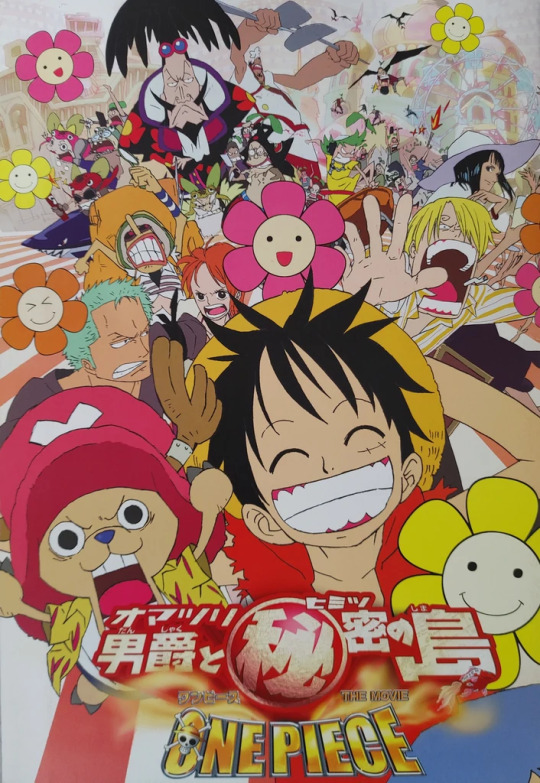
And sure, if you know One Piece's story you're aware the Straw Hats do have some important internal conflicts that make them have rifts in the crew, but the thing that makes this movie notorious is how this is portrayed. While the conflicts in the manga are major disagreements that lend to significant drama among the crew members, they still feel orchestrated. Masterfully played, sure, but they have this sense of being part of a bigger whole. The rifts in this film? They're just come from circumstances pushing the cast's imperfections against each other in a way that deprives them of the larger than life presence they would otherwise have. They become very organically flawed, and end up rubbing each other the wrong way.
It works like a deconstruction of many shonen tropes: How can you invoke the power of friendship when your comrades are fighting each other? How can determination win the day when your problem is something you can't solve with brute force? What if the bad things that happen to them are your fault in your search for adventure?
It's a fascinating watch, that starts like regular One Piece but turns into something else.
#animated films#adventure film#horror films#anime and manga#eichiro oda#mamoru hosoda#one piece#baron omatsuri and the secret island#roskirambles
11 notes
·
View notes
Text
Swapping the directors, twice, really turned it intova boondoggle. They had conflicting visions. (YMMV on which you liked) and it really showed. The second film spent half it's time changing course to he something jew amd the third spent half it's tike wrenching everything back.i remember hearing a tumor that Poé was actually supposed to die early in TFA, but test audiences reacted poorly so they kept him around. Blg mistake.
It's pretty easy to see they didn't have much for Poé to really do, and feels kike they simply split Finn up to try and fake two characters.
Imagine TLJ without Poé, where it's Finn vs Holdo. This changes the entire dynamic. Instead of some riff on big-man machismo heroism it's about seeing the Order in what Holdo is doing. No information given? I know best. Just follow orders. People dying without apparent purpose? He's right back where he started! Now it's competing sides, neither *wrong* but both making mistakes.
For Rey? Don't be gentle. *Let her Fall* (for now) let the throne room scene be her ascension, her graping at a family she has clung to (oh hai Anakin motif) Let Luke throw himself across the galaxy to square off again *two* perceived failures. Let the hunts of Finn's force sensitivity blossom and he manages to get some people out a *sneaky* way while power battles power fruitlessly on the planes.
Now we're at our low point at the end of act 2.
Third movie. Sorry Kylo fans, this is a damnation tale, not redemption. He's ascended. There is no Palpatine. Kylo's the top of the order food chain and he still only has his rage. He has achieved everything through his anger and in the end that's his only reward, more anger. Rey's the one being redeemed as she parses her fall wasn't built on force or fear, but sweet lies. Kylo isn't family, Kylo *hates* family.
So Kylo is setting up to burn the galaxy for the insult of being alive and not rewarding him when he becomes Vader 2.0. you've got Rey realizing there's no family here and she has made a bad bet but she abandoned the only family she had (I'm just like my parents) and she is stuck with this tiger by the ears.
Meanwhile Finn&Rebels are trying to regroup, run into the force sensitive troopers, find out about Kylo's scorched-space agenda and we get our big finalé setup. On the rebel side it's all about the powerless. The not-the-best doing everything they can. We still get our hero-man deconstruction but in a different way. Finn and the troopers are not even in the same sport as Kylo/Rey. Still, they have to do something because of *who they are personally*
Gather the galactic fleets, big battle. Zoom in. Troopers vs Knights of Renn. Zoom in. Rey vs Finn. She's obviously stronger but she is also all over the place. She's on rails and it shows. Finn keeps getting her in check but won't finish the job. She(and the rebels) are the family he never went looking for, vs Kylo and the order being a false family Rey couldn't be without.
She gets to winning through anger, but unlike for Ben, it clicks with her. This *isn't the answer* she's lost and terrified and she tries to end it by throwing herself on Finn's saber. He deactivates it(last second obvi) and she ends up in a hug. One of those powerful, pure, unquestioning hugs.
Rebels+Galaxy defeat the first order(which was never as strong as it appeared. Only factionalism, apathy, and indulgence let them have an outsized influence. Topical!)
Kylo- gets away! Without a powerbase but still a power. If you can't afford/don't want Driver then give him a fully disfiguring injury, completing his ascension to Vader-hood. We're building a future franchise here, you don't just drop an iconic villain potential like that!
So that's my brainstorm on a cold walk to work.
man. the star wars sequel trilogy could have been so good if they hadn't fucked it up
42K notes
·
View notes
Text
Spring Anime 2021: Embarrassment of Riches
So this current anime season absolutely stinks, which just makes the last one look even more impressive. Well, maybe not all of it...
Zombieland Saga Revenge
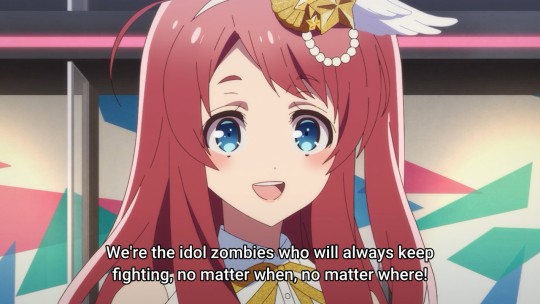
First off, you don't need to tell me that the following is a severe outlier opinion. We good? Ok. ZLSR is, in a word, subpar. I liked S1 back in the day, but it was already in the process of getting lazy towards the end. S2 continues this trend and is basically just another idol show. And as someone who actually does watch other idol shows I have to say that it's not a particularly good one of those either. The zombie gimmick has mostly stopped mattering and we're just doing what every idol show does, only with the odd occasional sight gag. The alleged subversive qualities mostly amount to a flashback for Yuugiri, which is admittedly the best part of the show but feels like it barely has anything to do with anything. Apart from that, it's a bunch of generic idol plots, rehashed character beats, shoddy attempts at twists (while not connecting to any setups from S1), and the obligatory "idols give us hope" ending, which is terribly hackneyed and flat out bad. Tae gets further memed into the ground, because of course she does. And there's stuff that was simply never good to begin with, like Kotarou and his comedy schtick, which gets truly insufferable now that there's no qualities to distract from it. It really makes me think that S1 wasn't even all that good to begin with and seems like an attempt to turn this surprise success into an easy money longrunner with no edge and no ambitions. "The idol show for people who don't watch idol shows" indeed, but not the way you mean it. 4/10
Bakuten
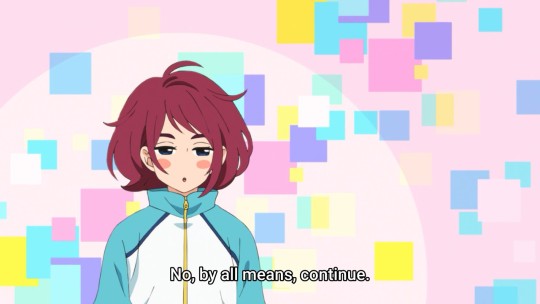
But not to dwell on the failures, with the second show we're already above the cut — barely. This one got my attention with its really impressive performance scenes early on and it totally sticks to that, which is even more impressive. But besides that? Well, this is by far the most predictable show in a season where I watched an unambitious Kiraralike and put ZLS on blast for having no ideas. The characters are a mixed bag, some are cool (Shida, Asawo), some are very annoying (Mashiro), but those are the supports. The main cast is extremely one-dimensional, which is fine until they try to heap a ton of pathos on their lead, which doesn't go well. But I guess execution matters, and Bakuten is slick enough to get by. Writing this down in stark daylight I feel like I overrated this show somewhat (I actually put it over the next one originally, which definitely doesn't hold up when thinking about it), but I was indeed mostly entertained. 6/10
Yakunara Mug Cup mo
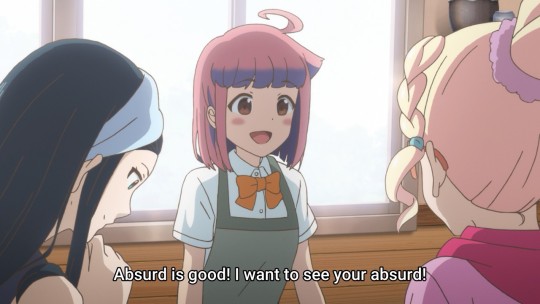
Yeah. Of course Mug Cup definitely doesn't invent or subvert anything either, but it's a pretty good Kiraralike that's always entertaining to watch. Explaining the qualities of such a nothing genre is as difficult as ever, but it mostly comes down to me liking the characters and it having nothing to annoy me. It's shorter than normal, which is a plus for slim shows like this. And yeah, you can make an excessive amount of dick jokes with the clay fondling. That helps too. Looks are just fine, pleasant but nothing out of the ordinary. Comfy low-effort anime. 6/10
Vivy: Fluorite Eye's Song
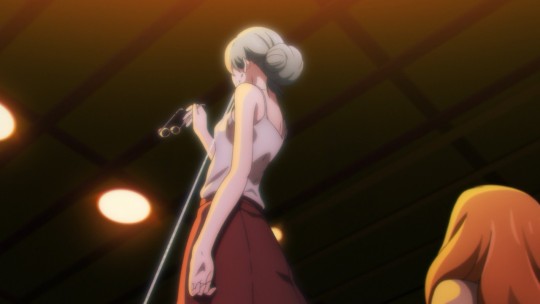
This one is decent, but sadly still a major letdown. Because the first few episodes of Vivy were excellent and kicked ass, but then it became increasingly clear that the writing can't cash the checks the ideas wrote while the action starts running into severely diminishing returns. Vivy just keeps slowly getting worse and worse as it goes on, not by a huge amount each episode but by the end there's a pretty sizeable gulf between potential and result. Going into detail would probably be a little much for this venue because there's a lot, but from the top level view the issue is that while Vivy has good fundamental ideas and steals at the right places, it just isn't a smart show — it's schlock, and by the end, poorly thought out schlock that tries to smooth out every problem with liberal application of the big feels hammer and le epic twist at that. Yeah, couldn't tell that the Re:Zero dude was aboard here, for sure. That said, it still works pretty well as entertaining schlock that is not to be taken too seriously, and the characters are generally just very fun to watch even when they're doing stupid things. Still, I can't in good conscience rate this higher than Beatless, a show that looks like butt but properly executes on its ideas. 6/10
Super Cub
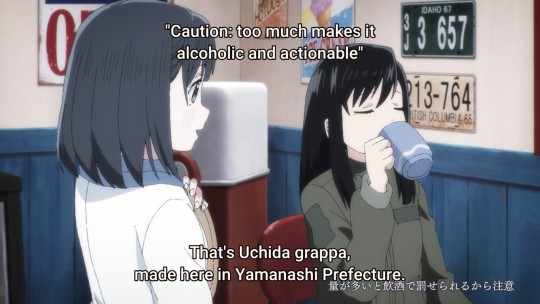
So this is 100% a Honda commercial, and I got really mad a Yuru Camp last season for being a blatant shill. Yet I'm feeling this, what gives? I think the main difference is that Super Cub is specifically a commercial for one product (and a very iconic product at that), while Yuru Camp is so all over the place that it ends up mostly a commercial for consumerism in general. And when Super Cub goes too hard on the product (which it does), it's at least pretty entertaining. That's something about Super Cub in general: It goes hard. Your regular Kiraralike this is not, because it's uncommonly slow, focused and moody - yes, it almost measures up to Yuru Camp at its best and demolishes it at its worst. Also, it's just extremely amusing to see sadblob Koguma grow a huge grizzly biker beard and become a badass outlaw dad to her goofy wife and cute daughter, all thanks to the power of afforable personal transportation. Needless to say, that can get unintentionally silly, but Super Cub has so much charm that it doesn't matter — it's great when it's good and still funny when it's not. 7/10
Shadows House
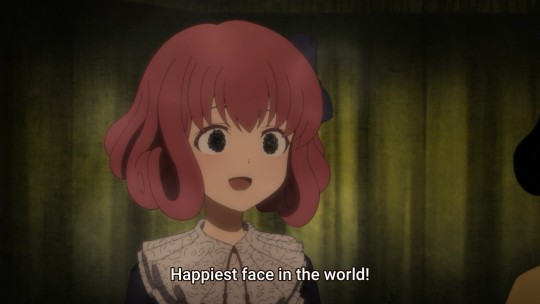
Shadows House turned up with a lot of potential, and I have to say it at least delivered on most of it. It has some problems; notably I'm not a fan of how the entire middle turned out to be a tournament arc of sorts that seems curiously inspired by Resident Evil memes, crest-shaped intentations and boulder punching included. I also think that this is a show that would be perfectly fine without explaining much, but I guess it is a shounen manga after all so we got dumped on eventually anyway. At least that came late - close relative Promised Neverland didn't show that much restraint. Shadows House is generally well written though, with great characters, interesting interactions and a great hook. But what really makes it memorable is that it's exceptionally good at the cute/creepy contrast, something that is often tried but rarely works as well as here, with great character designs and very appropriate production. I hope this gets a sequel, because it seems like it's just getting started. 7/10
SSSS.Dynazenon
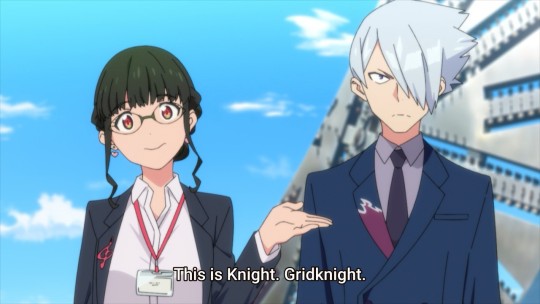
Coming in with a fondness for Gridman, Dynazenon didn't have to do much to convince me. The surprise though is that it's not a rehash even if it's basically the same show, a character drama where occasionally huge and goofy fights break out. Dynazenon is Gridman done better, and the interesting part is how it accomplishes this - mainly by being far more conventional. I do appreciate that Gridman went for something weird and almost experimental, but that only really paid off towards the end while most of the show was a distraction/holding pattern. It just didn't feel like there was enough material for a full series there, more like a movie maybe, if even that. Dynazenon fixes this by just being a TV show, with an actual cast of characters that each have their own arc. And by spreading the material this way, Dynazenon ends up having a lot more nuance than its intensely focused predecessor, while having the same themes and not actually being any deeper. In a way, Gridman ends up looking like the spinoff in retrospect, while Dynazenon is the full package. 8/10
Thunderbolt Fantasy S3
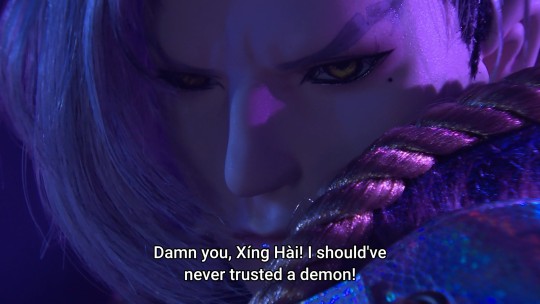
So how good was this season? So good that Thunderbolt Fantasy doesn't end up at the top, that's how. And all the elements that made Tbolt such a sure thing are still there, big hammy puppets doing stunts and scheming never gets old. However, I do have to note that at this point, the writing appears to have gotten too comfortable. I don't expect it to ever top the amazing S1 ending, but at this point it's like Tbolt has stopped trying to deliver on endings at all and seems in the process of retooling itself into a longrunner instead. Barely anything gets resolved in S3 (the climax is that the climax of S2 is resolved again, for good this time... maybe), and everything else is just setting up plotpoints for the next season. Tbolt is truly lucky that it doesn't actually need to resolve anything to be a great time, but at this point I have to say that I'd appreciate it if they wrapped it up with S4. 8/10
Nomad: Megalobox 2
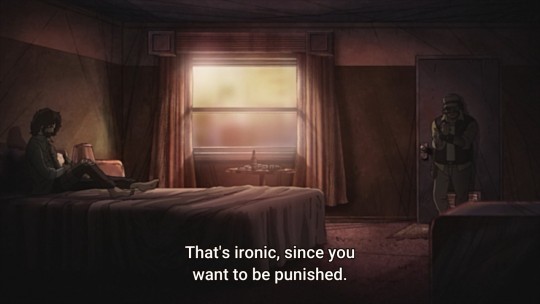
Speaking of sequels to shows I liked, Nomad doesn't so much improve upon its predecessor but steamrolls right over it. This is a tall order, since Megalobox was surprisingly good for a sports shounen and had a real nice, heartwarming ending that Nomad instantly negates for purposes of drama and everyone being extremely miserable. That sounds like a pretty terrible idea - and it would be, if Nomad wasn't as excellent as it is. To call it not the same show would be an understatement, because it's a true sequel, not just the same characters doing their thing some more, or new characters doing the same thing as the old ones did. Indeed my biggest problem with Megalobox was that it still closely adhered to its genre template and was very predictable; Nomad fixes this issue thoroughly. Nomad is about questioning what being a hotblooded shounen protagonist eventually leads you to, and how to fix everything you screwed up by being one. You could call it a deconstruction, but that term has been so abused for cynical, edgy "thing you like actually sucks" takes that I feel like it doesn't really fit here. Nomad isn't cynical at all, it's just a character drama about some boxers past their prime, and it being a sequel to a show that is indeed rather formulaic just enhances the experience. My biggest issue with it was that I really like what they did with Joe in this story, so the big focus on Mac's backstory felt like a distraction for a long time. But in the end that turned out to be absolutely necessary to make the ending work. The ending's just great, by the way, and I shall say not more about it. 9/10
Odd Taxi
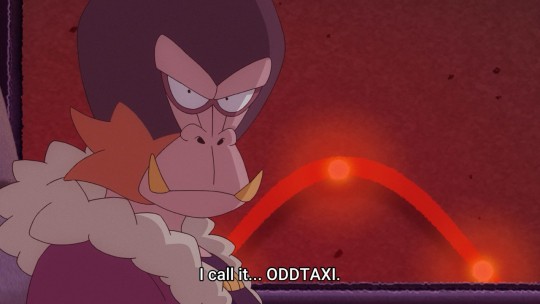
Yeah boy, here's the show that has apparently become somewhat of a "greatest show you didn't watch" meme, which I can feel smug about because I don't need YouTubers to tell me what's good and followed this from day one. Anyway, Odd Taxi is indeed great, the greatest show in a few years even. What starts out as seemingly a relaxed hangout show in the vein of Midnight Diners quickly turns into a psychological murder mystery while never losing its quirky humor. The character writing is outstanding, with even small bit players being on a level that the average anime wishes it could have for leads. And the rollout of the mystery is exemplary, with answers given and new questions raised every episode with a satisfying and logical payoff in the end. This is also the rare anime that has rock solid production from the first to the last second; it's never really flashy but excellently done and highly consistent nonetheless. And the music just owns. I have a few complaints, mainly that there's a few logical weaknesses in the story (which wouldn't even register in a lesser show, but sticks out here since the rest is so immaculately constructed) and that the ending overextends on the emotions when the rest of the show is so reserved and dry in comparison. But those are only the reasons why I didn't give it perfect marks, and I almost did that anyway. 9/10
#Zombieland Saga#bakuten#yakunara mug cup mo#vivy: fluorite eye's song#super cub#shadows house#ssss.dynazenon#thunderbolt fantasy#nomad megalo box#odd taxi#anime#review#spring2021
38 notes
·
View notes
Text
RWBY Recaps: Volume 8 “Midnight”
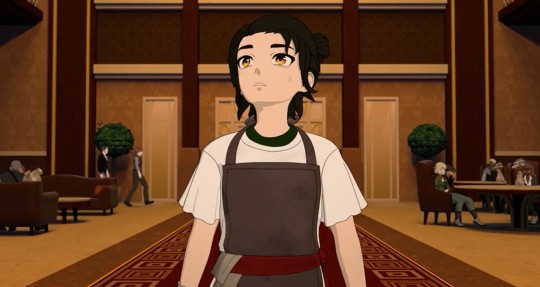
Happy Saturday, everyone! I’d like to extend a formal congratulations to every Cinder fan in the community. Criticisms of the writing aside, you all struck gold with twelve whole minutes devoted to your fave and I’m absolutely thrilled for you.
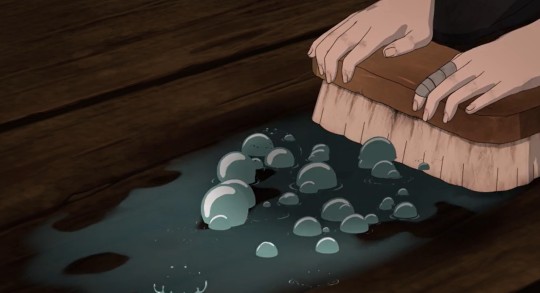
We again start with a dark screen and some audio, in this case Cinder’s scrubbing. This technique—along with closeups on eyes—is a real favorite of RWBY’s this volume, to the point where I think they’re a little too enamored with it. But at least this is just a preference, not something that actively harms the storytelling in any way, so it’s welcome to stay. This time, unlike our premiere, we stay on Cinder as her life is summed up with three events intercut with one another: scrubbing floors, getting taunted by boys, and the sound of heels making their way towards her. It’s clear that Cinder leads a poor, miserable life, if her dirty clothes and stronger guys throwing her around is any indication, but all that changes when the rich woman says “I’ll take her” and Cinder is transported to a better life in a wealthy hotel.
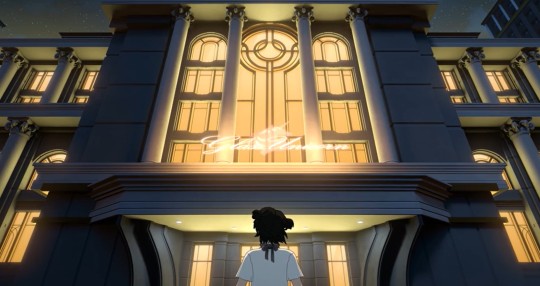
At least supposedly.
Here’s my problem with the worldbuilding. This moment has Witcher vibes and Witcher, in turn, built itself off of a trope seen a hundred times before: A young woman is treated terribly by her family, is whisked away by a wealthy/powerful caretaker, and though her life has arguably improved, she quickly learns that the new world she’s entered is just as dangerous and harsh as the one she left. In Witcher’s case, Yennefer is a disabled woman abused by her family, bought by Tissaia, and taken to Aretuza where the other girls hate her and the curriculum is potentially deadly. Cinder is a poor woman arguably abused by her family (scrubbing)/the locals (fights), is taken by an unnamed woman, and whisked away to the swanky hotel where the daughters hate her and the work is potentially deadly due to shock collars. The difference between these two setups is that Tissaia bought Yennefer because of her magical potential. Why does our hotel lady take Cinder?
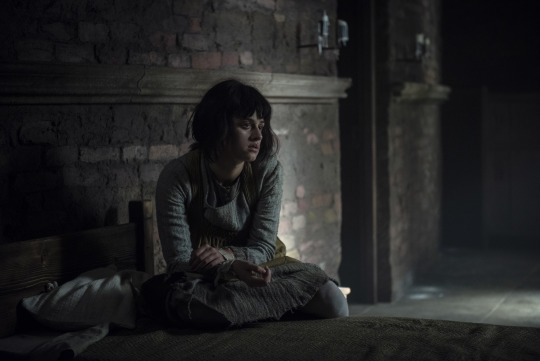
I mean yeah, obviously she wants a slave, but it’s a little weird isn’t it? Usually when a young woman falls headfirst into a new and questionable life, there’s a solid reason for her entry. This woman—whose lack of a name also says something about the worldbuilding—could have hired anyone she pleased to abuse. As we saw in regards to Atlas and Mantle in the past, every city has its poor and downtrodden. So what made her go out to some random farm and snatch Cinder up? It just, as always, feels a little too convenient. Cinder didn’t enter this life because something about her characterization or origin justified it, the plot simply ensured that she, out of everyone possible, and with very little reason, was the one chosen to follow The Plot™ .
It also messes with the Cinderella parallels. Originally (or “originally,” going off of Disney here which is likely what RWBY is using as a template too) it’s her step-family that abuses her and yes, we recreate that via the hiring (“hiring”—I doubt she was paid), but Cinder was already scrubbing floors back home. Her status as the servant already existed. So why change locations? Why not just keep Cinder as an abused farm girl, or have her a part of the hotel family right from the start? Part of the reason why Cinderella resonates is because of the contrast between the happy life with her father and the new, horrific life she falls into once he dies. Which is then further contrasted by the rest of the outside world. Fairy Godmother, Prince, and party-goers alike are all presented as kind, decent people. They represent the “real” world that Cinderella can escape to. By making Cinder’s original life horrible, her new life worse, and everyone connected with that life cruel and/or indifferent (with the exception of this one, special huntsmen)… you paint a very different picture of the world as a whole. Which is something RWBY has been vocal about trying to accomplish—it’s not a fairy tale—the only problem is with how these moments are undermined the second the story wants Ruby to ~Believe in People~. Cinderella is a story about enduring and eventually overcoming temporary hardship. Cinder’s story is about endless hardship that creates villains. A dark and fascinating story… but how does that fit into last week’s episode where Ruby told the whole world about Salem, expecting them to band together in peace and harmony? This is how Remnant’s world treats people when there’s not a global crisis, and Cinder isn’t even a faunus.
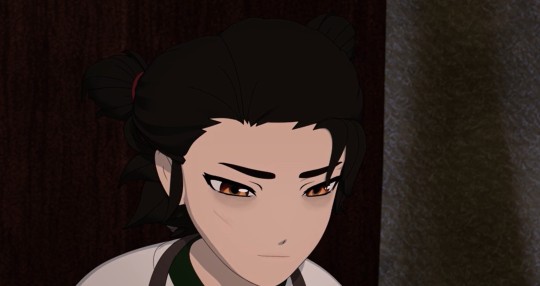
Which, I want to make clear going into the rest of this recap, does not excuse Cinder for her actions. At all. I think there are some complicated acknowledgements to be made in terms of her abuse and the Huntsmen’s responsibility in it continuing, but that does not give Cinder a blanket pass for all the horrific shit she has pulled over the years. Cinder didn’t just defend herself from abusers, she became one. More on that in a minute.
First though… is the Huntsmen’s name Rhodes? Did we hear that in the episode? If we did, I totally missed it because I have a note here about the one important character not getting a name. So yeah, idk. If we got this from more supplemental info, bad RWBY. If I missed it, bad Clyde. Either way, I’ll use that name going forward.
Back to the plot at hand. The hotel is, as said, populated by indifferent and shallow people and there’s no desert nearby, so I presume we’re supposed to be in Atlas? (Why did this woman buy a girl from another Kingdom?) There are customers getting drunk, flirting, and generally just enjoying their wealth, which harkens back to Weiss’ comment in Volume 4 about all their problems being superficial. We’re introduced to the owner’s two daughters who are, as expected, quintessential Mean Girls.
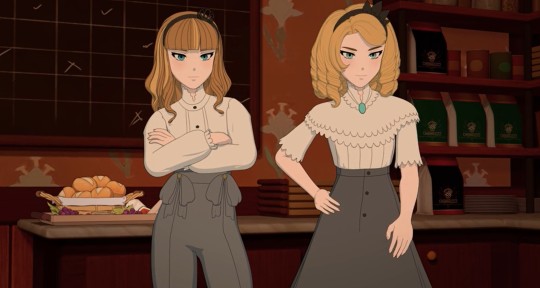
They love ordering Cinder around, not just with hotel chores, but personal ones as well like, “rub my feet”… despite the fact that this place is massive and must have an equally massive staff to stay in business. Why aren’t the girls terrorizing anyone else? Again, it makes sense for Cinder(ella) to be the focus of their abuse when she’s in a single household, but transplanting that to a hotel raises a lot of questions that RWBY hasn’t bothered to examine. You can’t move a story like that and not think about what further changes that would evoke.
See, RWBY could have done something interesting here by considering some of those other changes. Like having one or both step-sisters be the one to help free Cinder from her abuse, playing the villain before becoming the fairy godmother. Up until she turns villain instead of hero, this is just Cinderella’s story copy and pasted into RWBY. It’s moments like this that should make us wary of using fairy tale allusions as evidence for our readings and theories. Whether RWBY is deconstructing or upholding a story varies wildly, and we never know what we’ll get until we actually see it on screen. Even then we can’t count on a choice remaining consistent, as we saw with Ironwood’s deconstruction being tossed out the window in Volume 7.
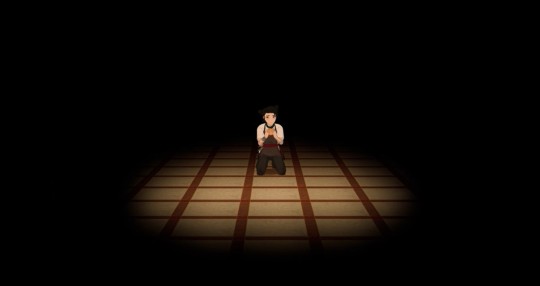
Cinder is originally just as meek as her fairy tale counterpart too. We don’t hear her speak until the owner is about to leave when she simply goes, “Food?” The sisters laugh at her and a roll is thrown to the floor with the comment that she should get busy because it “looks filthy.” I quite like that moment. Your job is to ensure the floors are clean enough to eat off of—literally.
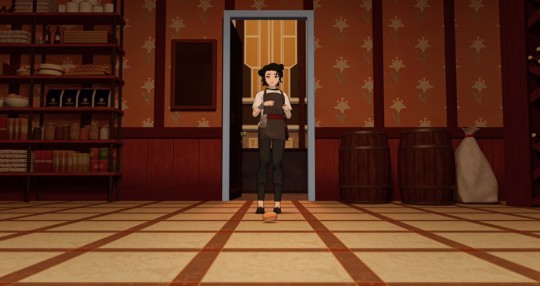
We see a montage of Cinder doing just that, lots of chores, with a new song listing all the tasks she’s now responsible for. During this, Rhodes is seen in the background and witnesses when Cinder (presumably) first uses her semblance by heating up the brush and chucking it at the sisters, creating a massive cloud of steam.
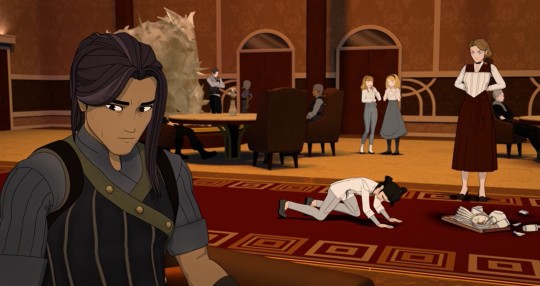
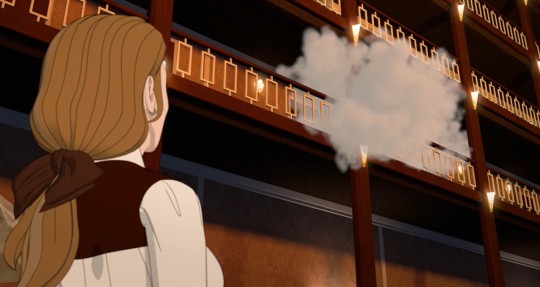
It’s that moment which “earns” her a shock session with her necklace and I’m staring at the screen, a little open-mouthed. I mean, that’s the second child torture we’ve seen this volume (with Cinder being ten here). Again, I’m not making a specific accusation, just going, “Really?”
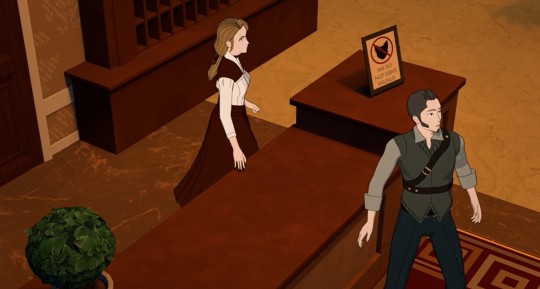
Also, note the anti-faunus sign. Nothing like continually showing us racist establishments rather than actually writing a story that deals with the racism needless put into the story world. I’d like to remind everyone of my previous comments this Volume about how the story works hard to paint Mantle as sympathetic, but refuses to show anything that does the same for Atlas citizens, people who are in just as much danger with Salem as an equalizer. A whole city is not actually made up of shallow racists, the show is just showing us only those people to create a simplistic “They’re all bad” reading that encourages us to reject Atlas and, by extension, Ironwood. Weiss is walking proof that Atlas citizens are both complex individuals and capable of bettering themselves. If we can come to adore the Schnee heiress, we should be questioning why nearly every other citizen is painted as an abuser, too wealthy to care, or has conveniently left the story (Rhodes dead, Klein gone, Whitley rejected, etc.).
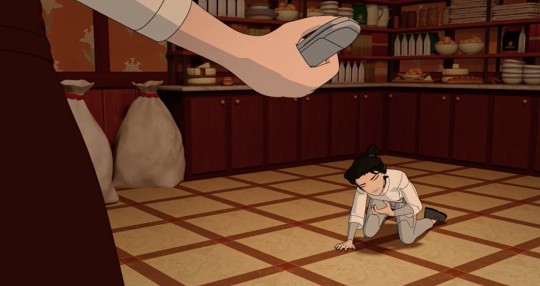
As Cinder is being tortured, we see that she’s forced to say, “Without you, I am nothing.” Now see, this is excellent... in theory. This is the kind of line we needed to hear with some consistency over the last seven years (if RWBY still insisted on waiting that long for a backstory), setting up that this line is clearly engrained in Cinder and she repeats it on instinct. Instead—to my recollection, anyway—we only get it this Volume, in two episodes. If it appeared before then it wasn’t notable enough to remember. I commented on this before, but it wasn’t a, “Ah, this line must be important” reaction, it was a “Lol why is RWBY using the same line twice? That’s weird.” By only giving it to us twice before the backstory and in such a short timeframe, the impact of this reveal is lost. We’re only now realizing that the line is important, rather than coming to realize why.
Our writers know just enough to recognize what techniques work, but not enough to have figured out what makes them tick. They get that providing a RWBY-vised version of Cinderella is cool, but not how to adapt that 100% successfully. They know that repeated lines have power, but not how to create good setup for the reveal. They know the camera should use closeups, but not what moments are important enough to warrant that. RWBY, eight years on, still feels like a newbie writer copying what the great stories are doing without yet understanding why those aspects work and, thus, how to recreate them.
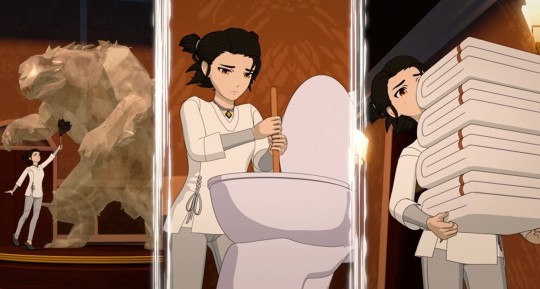
I mean, Cinder’s backstory appearing now attests to that most obviously. I waved at the Cinder fans before, but the reality is that most viewers don’t care, either because Cinder herself is so bland, and/or because the story waited too long to make her a little more interesting. This entire flashback was handled badly simply by virtue of it arriving over seven years past the character’s introduction.
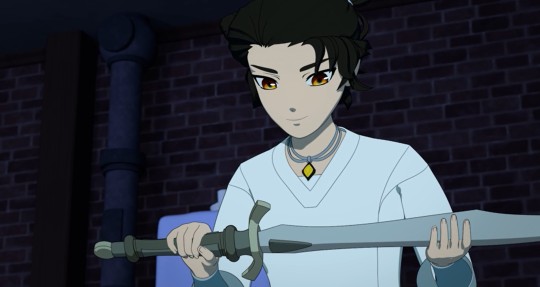
So after this torture session Cinder steals Rhode’s sword. We hear some dialogue in the background of him getting pissed that it’s missing and the sisters promising to find it, implying that Cinder will have this tool at her disposal for a while. Instead, seconds later he’s found her hideout and confronts her. I don’t know if I’m impressed with Rhode’s skills, or rolling my eyes at how contrived this all is. Chuck in the question of whether Cinder was talented enough to steal the sword out from under him, or if Rhodes was stupid enough to leave it lying around, and I’m edging towards the eye rolling.
He dodges Cinder’s attack, rolls her more weapons to prove he’s not here to hurt her, and acknowledges that she’s not getting “the most fair treatment.” Okay, here’s where things start to get complicated. Rhodes tells Cinder she shouldn’t run away because then she’ll be running her whole life (don’t really agree with that). He likewise (rightly imo) tells her not to straight up murder them because look, no matter how much of a shit stain someone is, I can’t condone slamming a sword through their chest on an individual’s say-so (especially when two of those people are also kids growing up under an abuser, like Whitely). So what’s left? Rhodes says Cinder can train to become a huntress. At ten years old, she has seven years to prepare for the exam.
But she has to stay with her abusive family until then.
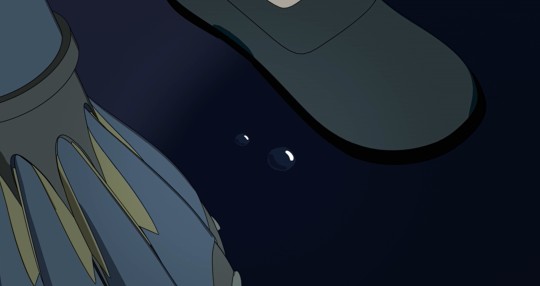
My problem is far less with the claim that this “has” to happen and far more with the writing’s failure to tell us why. Cinder could have begged to come with Rhodes and he says she can’t because… idk. Make up a reason. He doesn’t make enough to feed the both of them. It would be too dangerous out on missions without training and he doesn’t have a permanent place to stay (hence using the hotel all the time). He could even go the “They’re your legal guardians” route with more explanation because it’s arguable that Rhodes had no idea about the collar. Doesn’t mean Cinder’s treatment isn’t “that bad” in his eyes, just that he might not have known the extent and thus thought it was preferable for Cinder to put up with “just” being insulted and overworked until she’s 17. That this life that he only has a partial picture of is preferable to the life she’d have at his side. Something to explain the stakes here, the risks, and why he took this stance.
And/or give us a reason why Cinder doesn’t try to run, a suggestion I make very cautiously because it’s not my intention to put the responsibility solely on her. This isn’t meant to be a “Just save yourself! It’s easy!” claim. Rather, it’s an acknowledgement that young, barely trained kids go out into the world all the time in this show—Ruby, Oscar—and it’s an acknowledgement that Cinder tugged off her collar easy-peasy. The point is, practically speaking, Cinder could have left and braved the streets like Emerald did… so give us a reason why she decided to stay. Maybe she’s scared of living on the streets, acknowledging that a little food and a place to sleep is better than nothing. Maybe she’s scared that if she doesn’t have a direct connection to the hotel (convenience), Rhodes won’t train her anymore. Maybe, as an abuse victim, she can’t articulate why she won’t leave, she just can’t. Something to acknowledge these gaps because, right now, we just have the fandom going, “See? This is why the huntsmen are all evil cops. Rhodes took the lawful route and look where it got Cinder! He’s the responsible adult in this situation, so it’s all his fault.” Problem is, this take ignores:
The fact that our heroes are also huntsmen and were pretending to be huntsmen before they had those lawful licenses. So what does that make them? We can’t continually criticize these professional roles without criticizing our heroes’ use of them as well. Ruby just ensured the world would take her message seriously by introducing herself as a huntress. We can’t condemn these laws and privileges while likewise letting Ruby continue to use them however she please. It’s okay if she’s a part of the system, because Ruby is inherently good! That’s not how this works. I’ve just described every American cop show that tumblr is currently turning against: The system is corrupt and needs to be overhauled, but our protagonists are different.
The story fails to tell us why Rhodes won’t do more outside of a single line about Cinder being of legal age. That just acknowledges that age has some bearing on his decision, not whether it outweighs other considerations (can Cinder survive if she leaves?), or whether Rhodes even has a full picture of what’s happening to her (the collar). The takeaway is that we don’t know what his though process was because RWBY didn’t show it to us, not that his thought process is automatically awful.
Rhodes, as a literal stranger entering her life, is not 100% responsible for what happens to Cinder. I know people don’t want to acknowledge that because leaving a child in that situation is absolutely horrific, but if RWBY wants to be ~realistic~ (and it does) then we need to acknowledge that reality too. If you saw a child employee getting yelled at in a hotel and then found her with your sword, would you rip the collar off her neck and be like, “Congratulations, you’re my child now”? Nice as that trope is, probably not! Or hell, maybe a lot of you would upend your life and risk legal action to whisk them away, but a lot of other people wouldn’t... and they're not the devil for doing what they can within the bounds of the law. The idea that because Rhodes unexpectedly had one (1) encounter with Cinder means he’s now responsible for her life and outcome is, well, crazy. “But, Clyde, you can’t just see that kind of horror and not do something about it.” You’re right. You know what you do? Tell the authorities. But does Remnant have the equivalent of social workers? We don’t know! Which means we can’t assume that Rhodes didn’t call them just because he’s a bad person. Or maybe they exist and the fandom considers them too corrupt to be useful, like so many other authorities in this show. So… what else is there for him to do? There doesn’t seem to be anyone above Rhodes that he can turn to, he doesn’t (for whatever reason) want to essentially kidnap Cinder and start a new life with her, so what’s left? Try to give Cinder a healthy relationship and a way to escape in the long run, which is precisely what Rhodes did.
Honestly, I’m kind of salty that this guy went out of his way to help her, he saw what everyone else saw and was the only one who would help her, but because he didn’t do more—because he didn’t entirely upend his life and/or risk arrest to take her away to this hypothetically better situation—the fandom is acting like it’s his fault Cinder killed her abusers. It’s not. Cinder made that choice.
At the end of the day, blaming Rhodes reveals the expectation that it’s his responsibility to solve this massive problem purely because he had the bad luck to be the one Cinder stole from. That’s like telling a teacher who learns about abuse from a paper that following the lawful channels and going out of his way to assist the child in other ways is responsible when the kid murders their family one day. “Why didn’t you just barge into the house and take the kid?!” Because there are a hundred reasons why that would go incredibly badly? Rhodes can’t help Cinder if he’s in jail. Rhodes can’t help Cinder if she ends up dead on a mission while following him. Rhodes can’t help Cinder if their attempt at escape fails and she bears the punishment.
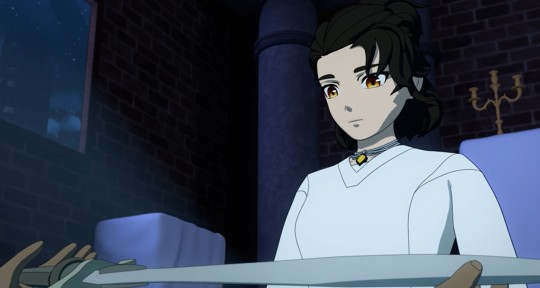
The only thing I think Rhodes did absolutely wrong was giving Cinder the sword while she was still under the owner’s thumb. Stupid, but not cruel. And again, stupid does not equal blanket responsibility. I’m likewise seeing, “Rhodes gave her the sword and thus it’s his fault that Cinder got in trouble. It’s his fault they died. What was Cinder supposed to do, not defend herself?” Are people forgetting that Cinder stole the sword herself in the beginning and then readily accepted it again? She had agency in obtaining weaponry and what she wanted it for. Are people forgetting that, in accepting it, she likewise accepted the risk of keeping it hidden in the hotel? Are people forgetting that the time skip shows this happening years later and that Rhodes clearly thought Cinder was past her murderous streak? Are people forgetting that Cinder killed the owner by snapping her neck and resisting the shock collar, no sword required? She could have killed them any time she pleased based on the crime scene, whether Rhodes had given her a weapon or not. The weapon was just the catalyst that, truthfully, could have been caused by anything else. Cinder snaps when they find the sword and she’s tortured. Cinder snaps when she drops another tray and she’s tortured. She had planned to kill her abusers and never completely let go of that.
Honestly, I’m just annoyed that we have another good hearted, takes action, does his best and makes some mistakes character getting blamed for everything another character chose to do, erasing their agency in the process. Rhodes did not abuse Cinder. Rhodes did not force her to kill her actual abusers. And Rhodes is certainly not responsible for what Cinder later becomes. Could Rhodes have done more? Of course, but every character could always do more.
The tl;dr is that this complex situation needed far better setup in the show and the fandom needs to stop using that lack of setup as “proof” that characters are horrible people when they fail to magically fix said complicated, badly explained problems. Cinder chose to murder three people. Whether that was justified in the face of her abuse is up to you to decide, but it was still her choice. Please stop blaming the adult male characters for the choices the teenage girls in this show make. RWBY is too convoluted and attempting to tackle too many complex issues to reduce that to, “Every man here is the evil, responsible party and ever girl is a #queen. Even when they go on to murder Pyrrha ^_^” As a woman who would very much like to be rooting for the mostly-woman cast more than I now do, this isn’t the feminist take people want it to be.
But I’ve jumped waaaay ahead. Let’s backtrack a bit.
That first interaction between Rhodes and Cinder is super weird because the camera keeps covering Rhodes’ face and I don’t know why.
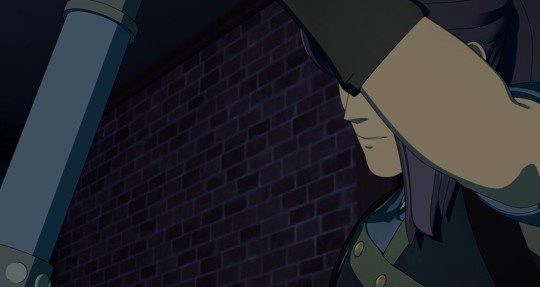
We segue into that montage of him training her for presumably years (Cinder’s hair changes) until we see him giving her the sword in what’s meant to be a moment of pride and trust. Soon after, Rhodes (randomly) comes back to the hotel when everyone else is asleep and hears noises in the back. Moving to check them out, he discovers that Cinder has murdered the two sisters and is in the process of murdering the owner, throwing back the line, “Without you, I am nothing, but because of you, I am everything.” Again, much more impactful if this had been a line we’ve associated with Cinder for years now, not a couple of episodes.
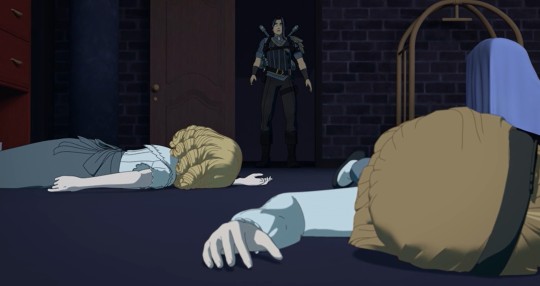
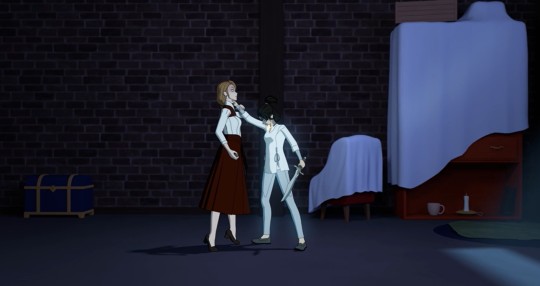
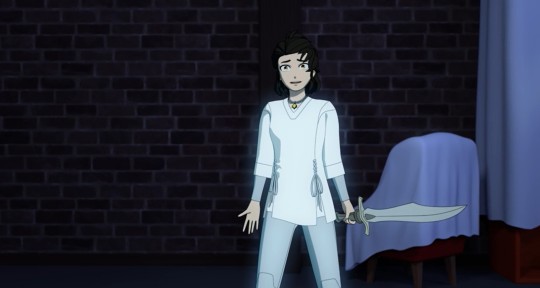
After she breaks the owner’s neck (damn, strong hand!) she tells Rhodes she doesn’t have to run anymore. Cinder clearly expects him to be happy for her and is shocked when he takes out his weapons.

I’m sorry, this is not a “betrayal.” Could Rhodes have just let Cinder go? Sure. Should he have? Given what she becomes, that’s very debatable! Rhodes clearly thought he’d helped her grow into someone who was not inclined towards murder (giving her the sword) and thus is probably going to be a little rattled when he walks in to find her killing three people. Again, there are obvious differences given the level of abuse Cinder seems to have suffered in comparison, but imagine that Glynda, after teaching Weiss for years, walked in on her killing Jacques and Whitley in revenge. Is she supposed to just ignore that? Shrug her shoulders and wish her well? I know a lot of people consider that the “fair” outcome given the inclusion of abuse, but that’s because we’ve had an omniscient view of Cinder’s history and insight into her emotional state. Rhodes doesn’t have that. All he has is his oath as a huntsmen to prevent things like, you know, murder sprees. I’m not going to delve into the overall ethics of a judicial system, either in RWBY or the real world, and thus I’m not going to make any naive claims about it being fair—it’s fucking not—but I don’t think the answer to these systematic problems is, “Why wouldn’t you just let the teenager murder three bad people and then go on her way? She totally deserved it!” Rhodes is not in a position to decide that, which is the entire point of having a judicial system in the first place.
So Rhodes wants to bring Cinder in. Kind of like how Clover wanted to bring Qrow in once he had an arrest warrant. I can’t emphasize enough that wanting to start a legal process rather than letting clearly guilty/potentially guilty people go because they WANT to is not a “betrayal.” Regardless of what teen dramas may have taught us, you don’t have to potentially throw your own freedom and your morals away because you found out a friend is wanted by the authorities. Or you walk in on them currently snapping someone’s neck. There are options other than, “Believe your friend is right without question and help them hide the bodies” (looking at you, Maria, Pietro). Whitely is not insane for going, “Hey, can you not make me an accomplice to a crime by forcing your way in here with a bunch of fugitives?” I’m constantly surprised by the number of fans who can, in one breath, condemn characters for not throwing a middle finger up at the law and in the next praise Jacques’ arrest. Do we want to benefit from this system or not? If yes, that means you have to weigh which laws can be broken (such as in a protest), which should be obeyed (bring murderers and wanted men in), all while working to change the laws that are prejudice and aren’t working.
Anyway, they fight. It’s short and sweet, backdropped by the large clock striking midnight, hence our title. I’m incredibly suspicious of Cinder breaking Rhode’s aura first, given that she’s still the student in training, but here we can more persuasively say he wasn’t fighting seriously, given that he then stupidly rushes towards her without a weapon. Still, that would be the second time now that RWBY has relied on elite fighters “holding back” to explain how the kids in training beat them, the first instance, of course, being with the Ace Ops.
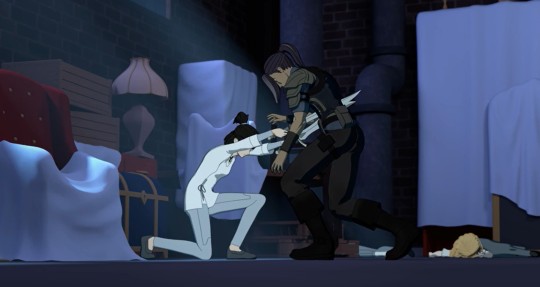
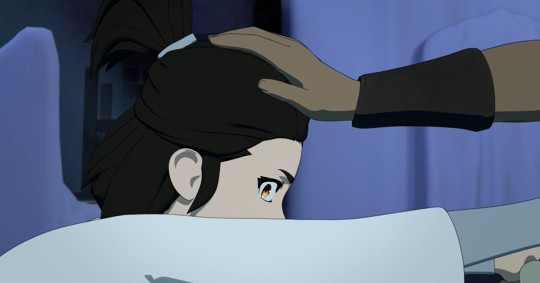
Rhodes does rush Cinder though when she hits the wall and breaks her own aura, clearly concerned. She uses the moment to stab him with both swords. He uses his last breaths to put a hand on her head, conveying that he doesn’t blame her for how this all turned out.
Then Cinder pulls off her collar with a single snap and looks up at the broken moon, crying her single tear.
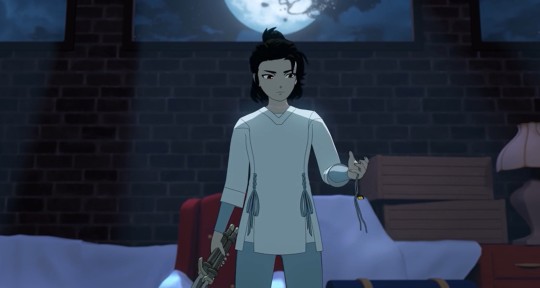
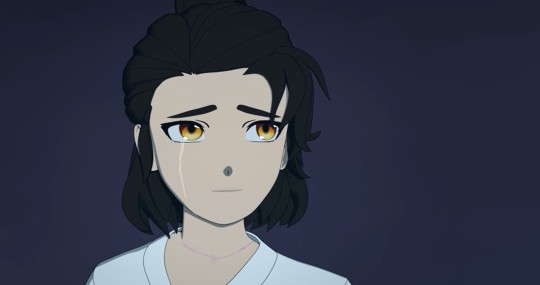
I’m dragging the flashback for multiple reasons, but I want to emphasize that I think this episode is leagues better from what we got last week. Absolute night and day. It’s just that, as always, improvements are incredibly comparative in RWBY. It’s not really good for numerous reasons… it’s just better than what we’ve gotten before. It’s “great” provided you go in with standards buried in the ground.
We then return to the present as Cinder wakes up in Salem’s whale. This scene gives us a great shot of her grimm arm, so cosplayers take note!
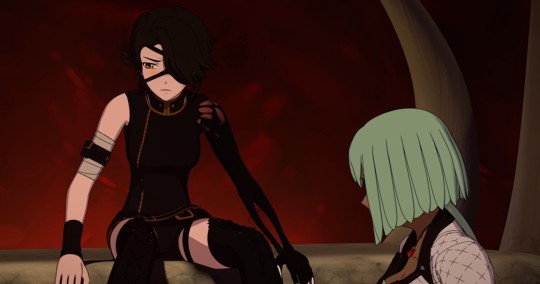
Emerald arrives soon after and immediately rushes to her side, expressing how worried she was. She grabs Cinder’s grimm hand without hesitation. Honestly, I don’t care much about either character… but this single frame activated some sort of ship button in my brain.
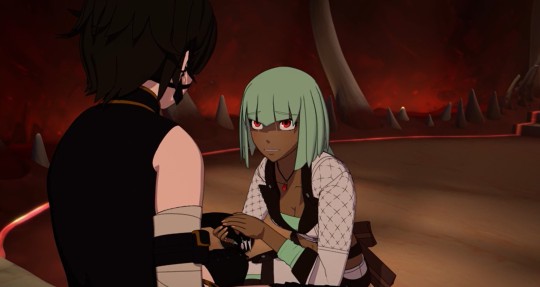
Not fully because I’m personally not drawn to toxic relationships in fiction (which, as I’m about to explain, would absolutely be the case here), but just the tinniest bit. Because I’m a sucker for monstrous people being loved despite their monstrous nature, so having Emerald take that hand over the other is like a ship speed run for me.
I’m predictable, folks.
But we need to talk about less happy things for a moment. I mentioned above Cinder becoming an abuser herself. I hope I don’t need to lay out the laundry list of murders, attempted murders, sabotage, and general taking-over-the-world-ness she’s engaged in since Episode One. Don’t let a sad backstory erase all that. Hell, for all we know the hotel owner had a horrific backstory too! Doesn’t justify how she treated Cinder. The point though is beyond her clear status as a villain, we now know that Cinder treats Emerald just like the owner once treated her.
Cinder was “rescued” from her life on the farm by the owner. Emerald is “rescued” from her life on the streets by Cinder.
Both realize over time that the situation they’re now in is actually worse.
Both reiterate that they “owe” the other “everything,” with Cinder having that shocked into her and Emerald seeming to willingly believe it.
The owner treats Cinder as a slave. Cinder treats Emerald as a slave. “Both of you, get out. I’ll let you know when you’re needed.” The only difference is that Cinder’s orders were things like “Scrub floors” and Emerald’s are “Convince an audience this girl attacked our ally.”
Both use threats to keep the other in line: the owner with her shock collar and Cinder with her Maiden powers. Cinder doesn’t need to resort to violence (yet) because Emerald adores her, but the threat is always there.
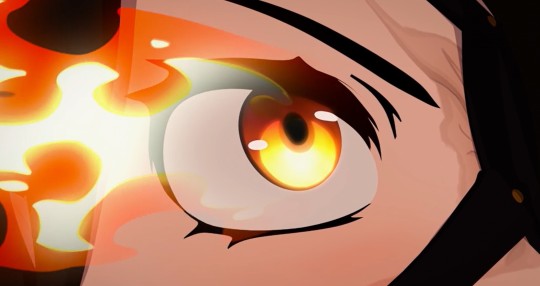
There are even visual similarities this episode, such as kneeling and gem necklaces, though I acknowledge fully that those are just interesting details as opposed to anything like persuasive proof.
The point is that Cinder became exactly what she hated, she just turned the dial up to eleven by going after the whole world instead of a single child. “But Cinder never had a chance to be anything else.” Sure she did. Blake and Weiss are proof of that. Even if we believe that Cinder was doomed to be a villain due to the extent of her abuse, what does that say about the hotel’s owner? We don’t know anything about her history, so what if she was abused too? Does that mean she was always “doomed” to treat Cinder that way? Does that excuse everything she did to her because she supposedly never stood a chance of becoming anything else? Of course not.
Though very iffily done, this is a commentary on the cycle of abuse. Each case is horrific, but it doesn’t excuse what comes later. Every abuser was once an innocent child and every innocent child has the capability of becoming the next abuser. Cinder’s life up until now was beyond awful and yes, she lacked a lot of privileges that others had to help them head down a better path, like Weiss’ wealth. On the other hand, she lacks other difficulties that would make that path harder for others, like Blake’s status as a faunus. Everyone has a choice to make: Will you treat others the way you were treated because that’s “fair,” or will you decide to treat others better than what you were dealt? There are lots of aspects that factor into the likelihood of someone choosing the latter—which is why I really like Rhode’s hand on Cinder’s head, acknowledging his understanding that she’s an abused kid taking the only path she thinks is available to her—but individual agency is by no means removed from the equation. Cinder escaped her situation and decided she’d never be powerless again. What does that mean to her, perhaps becoming a community member who works to prevent abuse like the kind she suffered? No, it means grinding the entire world under her heel until she’s the only one with power left.
This GIF continues to be the only one I need.

(No, the fact that it comes from a cop show and I’m using it for such an anti-law, anti-establishment story/fandom isn’t lost on me.)
(Also, if anyone is curious, this is why I love Ozpin. Out of everyone in this cast, HE has suffered the most, tenfold, and yet he still chooses to be kinder to those than they’ve been to him.)
Anyway, I should really stick to the plot lol. Cinder realizes that her waking up means that they’ve lost, which I still think is BS. Cinder needed a win to come across as a formidable villain again and the likes of Neo, Emerald, and a Maiden with years of practice under her belt should have wiped the floor with a scientist, retirement grandma, and a girl who got the powers an hour ago. But I again digress.
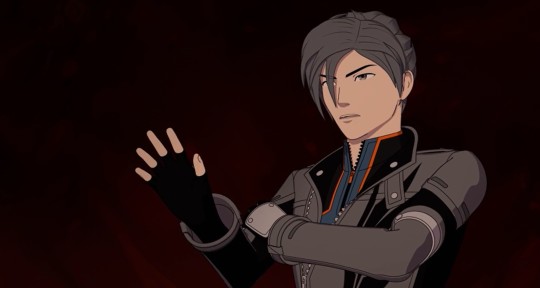
Mercury reveals that he will no longer be following Cinder’s orders because Salem has a special job for him. They’ve all been told to meet on the bridge.
Then we cut to Ozpin and Oscar.
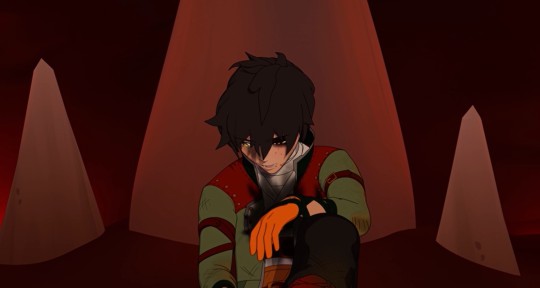
My poor boy is a mess and Ozpin is in the process of begging Oscar to take a “break.” “I would like to express again that this is my burden to bear, not yours.” Take note, fandom. In a few moments Hazel will accuse Ozpin of being a “coward” because “All this time, it could have been you, but you let him suffer.” I just know a bunch of people will be going, “Yeah! Ozpin just let a kid get tortured instead of him. WTF??” Okay 1. We should always be suspicious of agreeing with the takes villains have and 2. Oscar just refused to let Ozpin do that. It is—again—his choice because he thinks that Hazel is “holding back” with him. Oscar is being a brave and logical dude trying to make the best of this situation for both of them. Don’t take that away from him just to make Ozpin look bad. What would we even want him to do? Take control back? The fandom has been yelling at Ozpin for that since Volume 5.
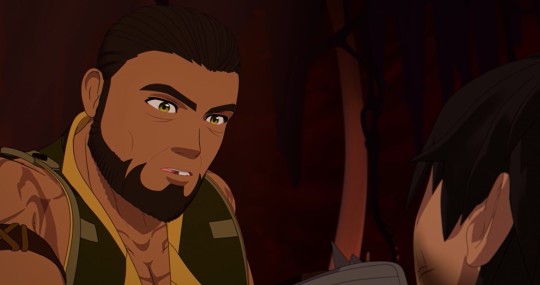
So they’re going back and forth when Oscar suddenly announces that they “can’t leave yet. This is our chance.”
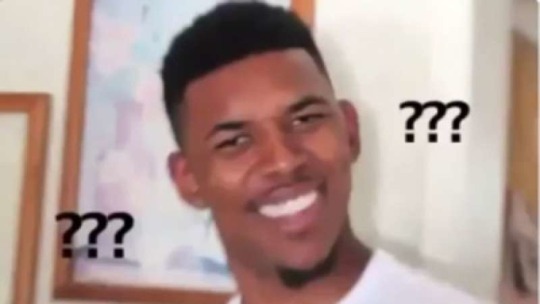
Ozpin even says he thinks Oscar must have taken one too many hits because… yeah. What? Long story short, Oscar recognizes that they’ll never be this close to Salem’s subordinates again and that they should try to undermine her from the inside out, just like she’s done with the world since she knows she can’t take on everyone at once. I love Oscar taking charge here, I love them speaking in unison, I even love the hope of achieving something epic while in captivity despite my own belief that Oscar should break and reveal the Lamp’s password. What I don’t love is:
Another messy, unexpected belief that Salem made her choices because she “knows” she can’t win any other way. Except that—like Ruby’s line in the recording—Salem’s current attack blows that idea out of the water. She IS taking on the whole world. Granted, Ozpin and Oscar presumably don’t know that the whole world literally knows of her existence now, or that Salem was smiling about it, but they do know that she’s attacking Atlas head on. What else is that except a declaration of war with all of Remnant?
The idea of undermining Salem from the inside via Hazel. For anyone who reads my other metas, I just said that this idea wouldn’t work because Emerald isn’t the one torturing him, the one character who has consistently demonstrated hesitation (or, now, Neo). Hazel despises Ozpin so much that he would never listen to him. He despises him so much he doesn’t even see Oscar as his own person… at least he didn’t before. That’s been retconned now with Hazel going “easy” Oscar and having an actual conversation with Ozpin. Whereas before, he was slamming Oscar into walls and screaming about how he’s going to kill the “murderer” of his sister. They basically softened his character to make this plan possible.
The fact that this scene came about without Oscar and Ozpin ever getting to reconcile their problems. Last we saw them, Oscar was saying how he hated that Ozpin came back and refusing to acknowledge their merge. Now, they’re working together like they’ve always been solid allies. I get that the danger they’re in helps to put it all into perspective, but why can’t we get a few lines of them hashing this out? Or at least putting things aside until they’re out of Salem’s clutches? If you don’t need to re-write Hazel’s character with “he’s going easy on me” lines, you can use that space to deal with the conflict we’ve already established. Especially given the strange choice to have Oscar refuse to give up control and be the one coming up with this plan... but then Ozpin does take control and (maybe, see below) enacts it? I feel like we’ve missed huge chunks of this story. As it is, I wonder if RWBY will bother coming back to this. The questions of if/how Oscar will accept Ozpin and if/how he’ll reveal this secret to the group feels like they’re being swept under the rug and it will likely go unnoticed by a lot of viewers simply due to how intense the kidnapping plot is.
So things are a little messy, but otherwise enjoyable, and they’re about to get downright confusing. For me, anyway. See, Hazel reveals that he follows Salem because she can’t be beaten (cue my continued worry about Ruby telling the whole WORLD). She “can’t be stopped. She’s a force of nature,” and Ozpin is fighting a “cause with no victory, no end.” He yells back that “Someone has to try!”—bless this man—and then looks down at the ground going, “Salem can be fought. Unless… she brings the Relics together, if that happens…” and mentions summoning the Gods.
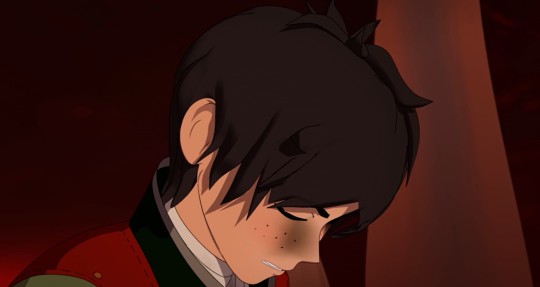
So here’s my confusion. The scene makes it feel like Ozpin is planting some sort of seed in Hazel’s head. He and Oscar JUST got done agreeing to try and undermine her from the inside out, then we get this line that feels like him “accidentally” dropping a secret that will turn Hazel against her. Except… Ozpin doesn’t lie here? The line isn’t useful to them as far as I can tell. They are screwed if Salem gets the Relics. …Right? Because if not, why the hell have the heroes been working so hard to keep them out of her hands? So I can’t decide if:
A) This scene is just written badly and none of this is part of the plan to undermine Salem.
B) Ozpin is going, “NO. Don’t collect the RELICS. That would be the WORST THING EVER /s” in an attempt to trick Hazel into doing it anyway and this is somehow supposed to hurt Salem, despite being presented since Volume 5 as the worst outcome for our heroes?
C) Ozpin specifically wants Salem to make the mistake of summoning the Gods because he thinks he’s completed his task? Or something? But what in the world would make him think that—especially without seeing Ruby’s message (not to mention the lack of unity that mess should cause)—or what makes him think the Gods would just destroy Salem regardless of what he’s achieved? If summoning the Gods was ever a defeat Salem option, why hasn’t he done it before?
I’m leaning towards A just because it makes the most sense by far, but that would also mean we had Ozpin and Oscar decide on this plan, have a chance to start this plan… and then didn’t actually do anything. Yelling at Hazel for following Salem isn’t a new strategy, they were doing that before, so what’s new? Or has the new strategy not been revealed yet? Idk, as happy as I am to see them being BAMF together, I’m slightly unsure about how it all hangs together. I’d much rather have an internally consistent and clear outcome that’s predictable (Oscar breaks or just holds out until rescue) rather than what appears like a super cool, badass, unexpected plot on the surface… but crumbles once you poke at the foundation a bit.
So whether Oscar and Ozpin started this plan or not, they’re dragged into the throne room where they’re forced to kneel before Salem. Yikes. She sits on her throne with the Hound, who I’m only now realizing could be read as a messed up Toto
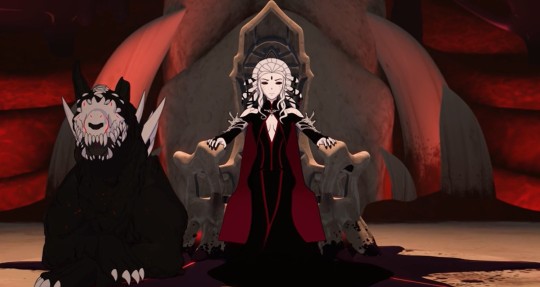
We learn that Tyrian heard from Watts about his incarceration and hacking Penny. What? Okay, I took the time to go back through “Amity” just to find this screenshot.
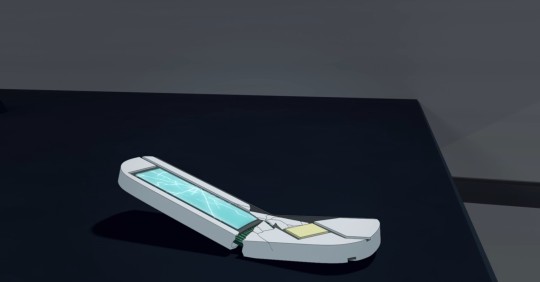
That’s not a working Scroll! Idk what I thought Watts might do with it at the end of last week, but it wasn’t send a full, uninterrupted message to Salem that updates her on everything that’s gone down in Atlas. This thing is toast! Moments like this make me question how much communication there really is between the writers and the animators, despite last Volume’s disaster with Oscar telegraphing his punch like whoa. Are we still getting that level of miscommunication?
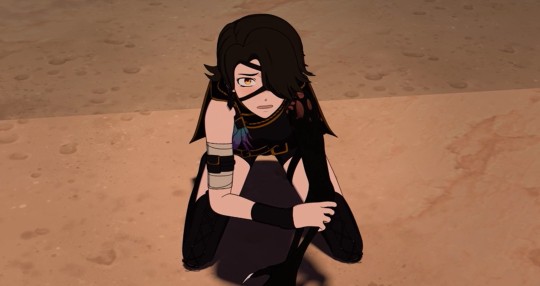
Salem then punishes Cinder for disobeying her by hurting her grimm arm. See, this here (for me, anyway) is the mark of a newbie writer. When the moment first started I went, “Oh nice. Just like the shock collar!” Then the scene made that abundantly clear by cutting to flashbacks of Cinder in her collar. That’s too heavy-handed. We already got the parallel, but then the show went, “Do you get it??” It shows that the writers are too scared that the viewers won’t get it, that their nuance will be lost, so they scramble to make it as obvious as possible, rather than trusting in their own writing.
And if you’re like, “So you want RWBY to be more clear and also… less clear?” the answer is, sadly, yes lol. The things that are already confusing due to retconning and inconsistent themes need to be made explicit, whereas the details that are already strong don’t need an in-your-face, “Okay, but did you really get the parallel here? We’re just making sure.” It’s like launching into explaining why a joke is funny when it’s already landed vs. telling a nonsensical joke and then waiting for the laugh that will never come. RWBY struggles in both areas.
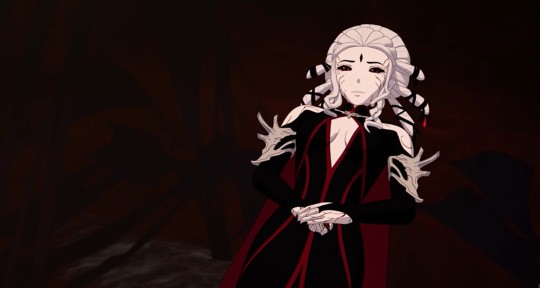
Salem delves into this speech about how this is actually all her fault and she should let Cinder spread her wings or something. AKA, go free Watts and track down Penny. Then you can have your precious Maiden powers.
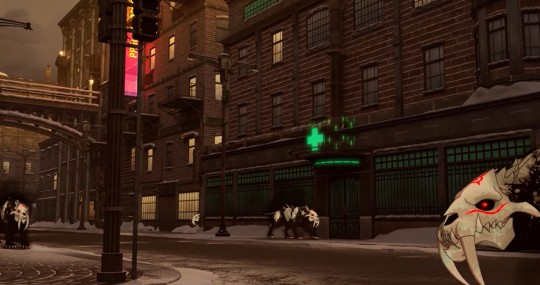
There’s a massive earthquake across Mantle and we watch a + medical symbol go out. Again, heavy-handed. We don’t need that in order to understand that the whole city shaking while the grimm look happily up to the sky is a bad thing.
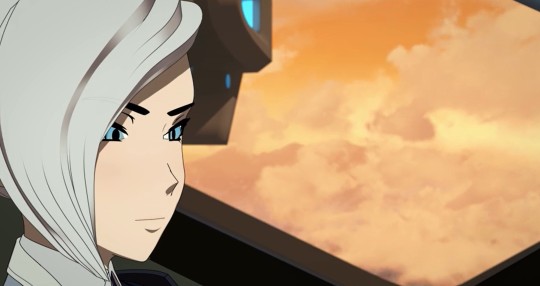
We cut to Winter listening to the Ace Ops complain about Penny. She tells them to act like the elite they are, likely because she hates how they refer to Penny as “junk.” Still being set up to betray Ironwood, I bet. During this scene we learn that they have “confirmed visual of her leaving Amity. She appeared to be malfunctioning.” So Penny is alive? Also, they have eyes on Amity Tower and were able to see Penny leaving, but didn’t see any of our trio coming to launch it in the first place? Did Ironwood want it to launch? Did they see Cinder? I just don’t know.
Before they can get there though a message from Jaune comes through. Serious kudos to Team JNY for asking that “anyone” respond/taking the personal risk of calling for help in the first place. They’re finally putting—as Harriet says—they’re own selfishness aside in favor of the greater good. Yang obviously hates that it’s “you guys” they ended up with, but she’s not outright attacking the Ace Ops or anything. I’m like,
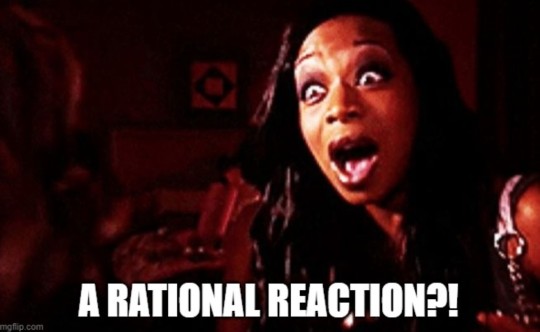
Excellent job, Yang.
Jaune is a little harsh in his panic. He said in his message that a “large mass of grimm” is heading towards Mantle and then when Harriet leads with asking about Penny, wants to know what’s wrong with her. Why are you asking about Penny when lives are in danger and “it’s” (the grimm) are “right there”? Except he, uh… points at nothing. There’s the chasm with (I presume) the weird grimm goo down it? Not sure based on the shot, but the Ace Ops expected a “mass of grimm” and then land to see no grimm anywhere nearby. So yeah, they’re more focused on the missing Maiden than the seemingly imaginary enemy Jaune is freaking out about.
They only get on board when the river launches itself at Atlas.
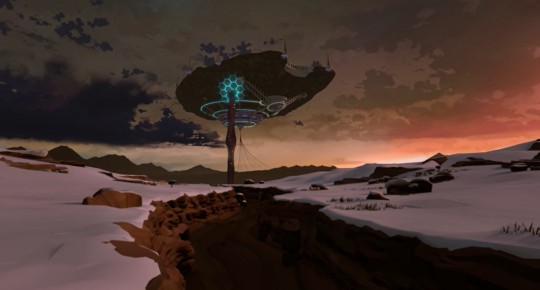
So the goo is, like, sentient before it becomes individual grimm? Or Salem is controlling it from her whale? Either way it’s BAD.
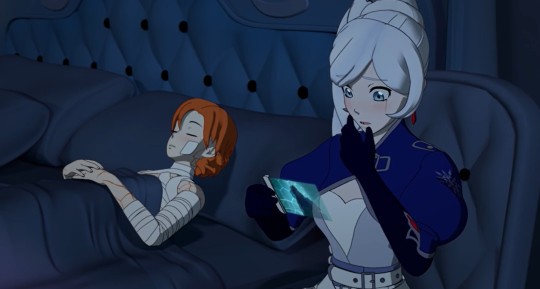
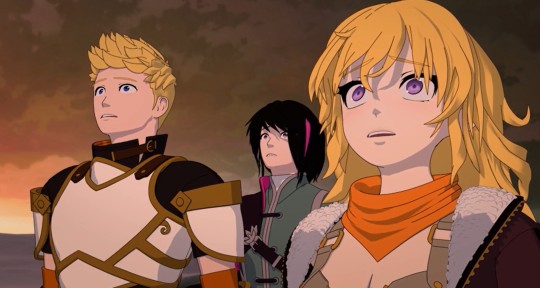
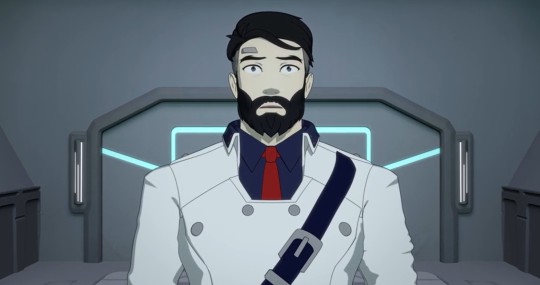
I want to briefly gripe about how the hell everyone is watching this. What, is there a camera conveniently trained on this one random part of Atlas’ underside and everyone’s scrolls tuned into that the second the attack started? It seems far-fetched, to put it mildly. In RWBY’s favor though, I want to acknowledge that we finally have appropriate expressions for the situation! This is good!!
I’m going to level with you all. My notifications have known no peace since I made the mistake of criticizing the adored trio that is Ruby, Weiss, and Blake. I thought supporting Ironwood would get me heat. Nope. Not supporting the main girls is what did it and honestly? I shouldn’t have been surprised. Last week I pointed out that having them smile and, in Ruby’s case, coo during a moment of horror is not good animation and implies some pretty uncomfortable things about their overall sympathy level. The image in question:
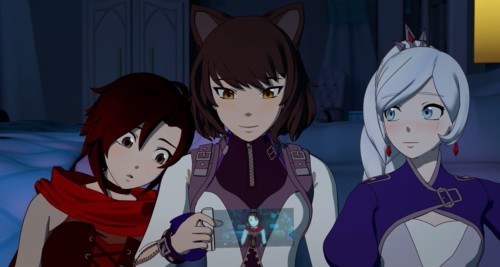
It doesn’t set a good tone, especially when we add in what we’ve gotten for Ruby’s group across the rest of this volume. The counters of, “They need and deserve a break. Why won’t you let them be happy?” fall flat when we ignore that this group has been animated as consistently goofing off post-premiere. Sneaking into the guarded military base of a former friend? Tube shenanigans! Need to find your way around? Funny Penny moment! Semblance reveal? Cutesy chibi explanation! Need to do more sneaking? Silly coffee plan! Nora gets electrocuted? Joke about how awesome that was! Even Wiess telling Whitley to go to his room reads as funny to the audience.
Ruby in particular has been a problem, given that she’s our main character and the others’ leader. We take our emotional cues primarily from her. Alongside being a part of all these fun and games, her animation during more serious moments has been less than stellar. This is Penny when Nora goes down.

This is Ruby, Weiss, and Blake. No worry, just focused on the fight.
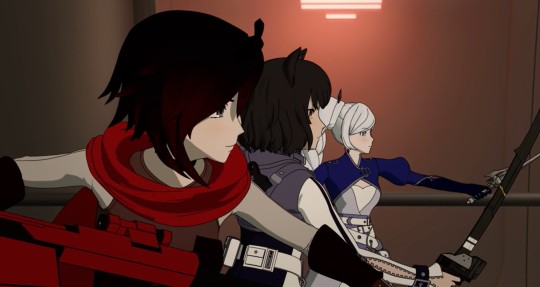
This is Penny when the fight is over.
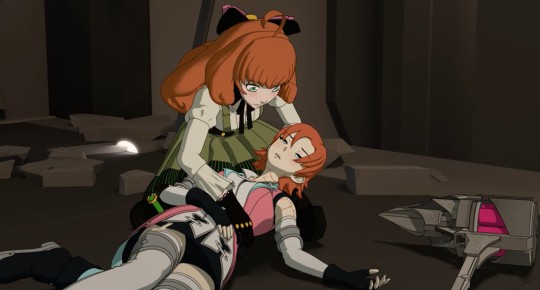
This is Ruby, Weiss, and Blake. No worry, just chatting about suspicious activity.
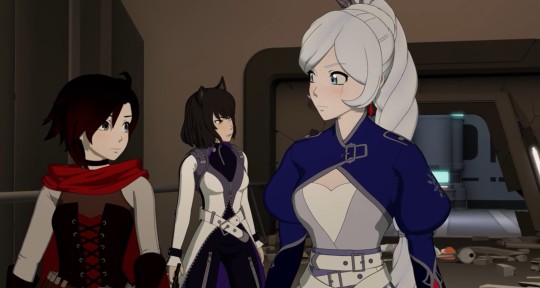
This is Penny in the airship, worrying about Nora and the situation they’re in. This is also Ruby in the airship, apparently not worried at all.
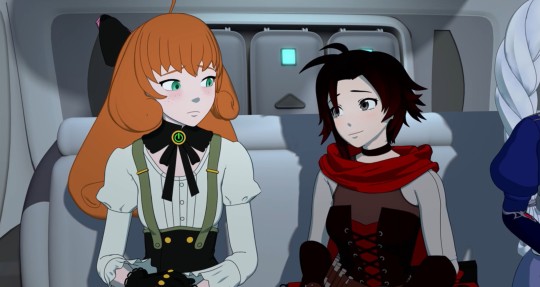
This is Ruby when she learns her uncle is in jail. Is there shock? Fear? Horror that he might be in serious trouble? No, she just maintains the same emotion she had before: fury at Harriet.
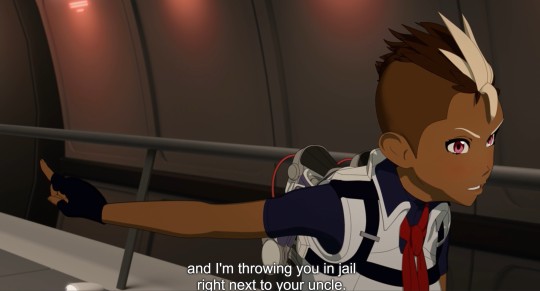
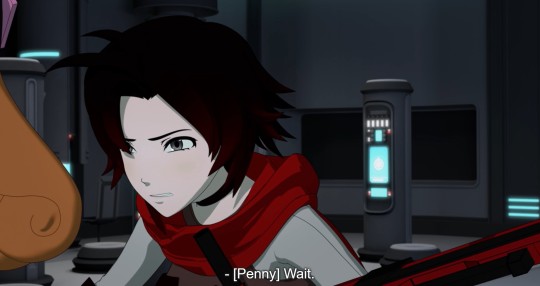
So when we reach them watching the recording and they look like this:

No, I’m not convinced that this trio is taking the situation seriously, or that they really care about the people involved. I know they’re supposed to care, they all obviously care from a meta perspective, but the “obviousness” of that only exists in our personal understanding of the characters if we don’t see it on screen. I completely believe that Penny is worried about Nora because she’s animated expressing that worry. I completely believe that JRY are in the middle of a warzone because they’re (mostly) animated as fearful and angry. The rest of Ruby’s team has a scared line from Blake and Weiss holding Nora’s hand, whereas the majority of the emotion across this adventure has been indifference or playfulness. That’s a problem given how horrible the events of this Volume have been, most of which the group is aware of.
All of which is an incredibly long-winded way of saying that this
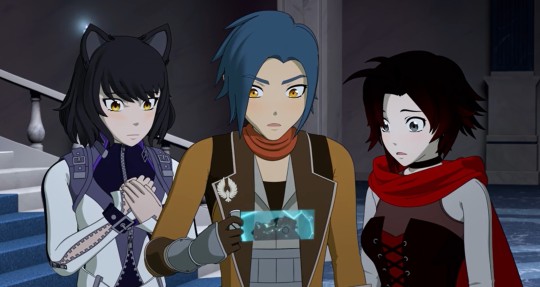
finally feels appropriate. Well done, RWBY.
Alright, this recap is already over 7k long so I want to return to our plot with the summarized: IRONWOOD WAS RIGHT. He said they couldn’t withstand a head on attack by Salem and he was right. It literally took seconds for her grimm to burrow into Atlas, knock out a tower, and disable the shield. Everyone still claiming that leaving is useless because it’s oh so obvious Salem’s grimm could fly however high it wants (when did we learn that?) are ignoring that leaving was at least a plan with some kind of hope attached to it. And, given her focus on the Staff, may have saved Mantle by drawing Salem’s attention away from the city. The point is we don’t know. All we do know is that Ironwood tried to do something in the face of hopeless odds, Ruby’s team stopped him, and now look, everything is awful. No one could have possibly seen that coming.
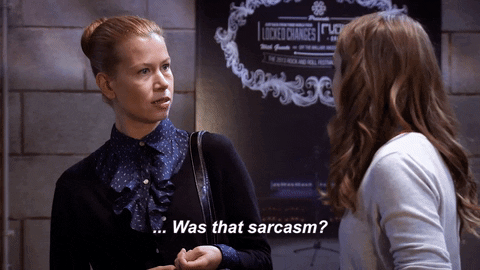
Salem: “It’s time.”
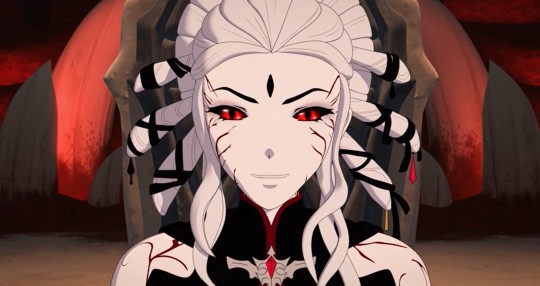
I’m very pleased that Salem is finally using the tools at her disposal. Upon reflection, I still don’t buy why she had to wait. “Well, she was waiting for the grimm goo.” She couldn’t have used flying grimm to take out the tower? Take a burrowing grimm and give it wings? She couldn’t have used the goo that was apparently inside her whale the whole time?
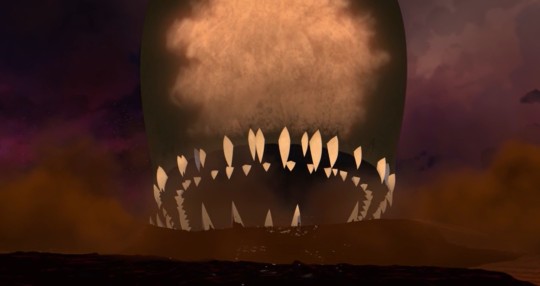

It’s all very convenient. In the sense that we’re drawing out the volume by having the villain inexplicably hang back, despite not having a good reason to. In the sense that—unless Ruby’s message comes back to bite her—the villain’s passivity also conveniently let the heroes accomplish the one goal they were desperate to achieve. All of that’s still not good, but at least the Volume seems to be moving out of the “not good” category and into the “slightly better” territory.
Although, as I just acknowledged to a friend, RWBY seems to alternate for me. Every time I have an episode where I think, “Okay, there are still massive problems here, but I can see a glimmer of hope” the next episode is inevitably the pits.
Still, grabbing onto that hope with both hands: Atlas should be decimated, folks! Grimm are swarming, our idiot heroes herded everyone directly under the city, the world should be panicking, and the cold should still be killing people if the story remembers that it exists. At this point my only question is wtf our heroes are supposed to do next, but regardless of what the plot gives us, it’s going to be wild. You all know what’s coming. Next week is our final episode before a two month hiatus, which means we’re going to witness all kinds of awful and then end on a six week cliffhanger. It’s inevitable, so best to emotionally prep for that now lol.
I don’t believe we have any Bingo updates, with the exception of edging towards a few: “Winter betrays Ironwood,” “Army of grimm conveniently doesn’t kill any civilians,” “Atlas somehow survives,” and “Ironwood dies” being the most notable. We’ll have to see what, if anything, gets checked off next Saturday.
As always, thank you so much for reading (I feel like I don’t say that enough :D) and I’ll see you next week! 💜
[Ko-Fi]
94 notes
·
View notes
Text
Daenerys Targaryen's tropes - The Woman Wearing the Queenly Mask
A princess or a queen who is the supreme ruler of her country. She is usually beautiful but certainly clever, strong-willed and charismatic and she cares about her land and her people.
The problem is, her people — for all that they need a ruler — don't want her. They don't want a young woman, or they don't want any woman, or they just don't want this particular woman on the throne. But she is the one best equipped to see them through the current war or other disaster, and she sure as hell isn't going to turn the country over to the treacherous aristocrats who would be next in line if she stepped down.
So she takes the reins with silken force and makes them follow her through brute cunning and charisma, overawing her detractors through her impeccable style, speech, imperturbability, wisdom, indomitable will, disdain for frivolity and — where necessary — utter ruthlessness. Even her love life is coolly calculated and orchestrated to best effect, often involving Arranged Marriage setups like Altar Diplomacy.
And if it wears her out, she'll just have to drink more coffee and soldier on. Her personal happiness is a small price to pay...
An important part of this character is that she isn't in a trusting and happy relationship (platonic or otherwise) as this would make her burden less heavy for her and thus remove much of the conflict inherent in this archetype. (It would also make her less alluringly lonely.) Naturally, this sad state can change over the course of the story.
This trope is being deconstructed and reconstructed with Dany.
1) They don't want a young woman, or they don't want any woman, or they just don't want this particular woman on the throne.
Dany is hated by the slavers because she's an abolitionist threatening their main source of income, but the vast majority of the freedmen love her.
2) But she is the one best equipped to see them through the current war or other disaster, and she sure as hell isn't going to turn the country over to the treacherous aristocrats who would be next in line if she stepped down.
The deconstruction of this trope is most apparent here. On the one hand, yes, it was important that Dany stayed in Slaver's Bay so that the noblemen wouldn't undo her pro-freedmen reforms:
“...I will not let this city go the way of Astapor. I will not let the harpy of Yunkai chain up those I’ve freed all over again.” She turned back to look at their faces. “I will not march.”
“What will you do then, Khaleesi?” asked Rakharo.
“Stay,” she said. “Rule. And be a queen.” (ASOS Daenerys VI)
On the other hand, Dany also makes mistakes that cause massive problems. She left the Yunkish slavers' wealth intact and refused to wage war against them because she assumed that they would leave her alone if she did so. This indirectly caused the Yunkish slavers' siege (which left the Astapori starving and spread the bloody flux) and conquest of Astapor and their killing of its citizens, which then allowed them to march on to take Meereen as well. Dany also left the Meereenese slavers' wealth mostly intact, which allowed them to retaliate against her anti-slavery stance by killing freedmen with the Harpy's Sons. Basically, she ended up having to fight enemies inside and outside her city partly because of her shortcomings.
That being said, it's important not to excessively blame Dany for all of this because the slavers have agency of their own and they deliberately caused all of these problems. Also, acknowledging Dany's failures is not to say that Dany's leadership style is bad (she is a good queen), only that this trope isn't being played straight with her because, despite her presence being needed, she still has things to learn and her problems aren't going to be solved overnight because they're meant to be realistic (deconstruction). This, of course, makes Dany's character and storyline that much more interesting. One of the main lessons of her journey is that she wasn't ruthless enough against the slavers and will need to be in the future in order to protect her people (reconstruction).
3) So she takes the reins with silken force and makes them follow her through brute cunning and charisma, overawing her detractors through her impeccable style, speech, imperturbability, wisdom, indomitable will, disdain for frivolity and — where necessary — utter ruthlessness.
The trope isn't played straight here either. Dany is cunning when she needs to be, as we saw in Astapor and Yunkai and Meereen. She is very charismatic, which we see from the way she naturally behaves to the fact that she has attracted and influenced thousands of people. She has an indomitable will, which is clear from her refusal to leave Slaver's Bay without freeing all of its slaves to her desire to reform Meereen.
On the other hand, Dany isn't stoic and imperturbable. She is Wise Beyond Her Years, but that doesn't prevent her from making mistakes and failing to carry out her plans. She only maintains an impeccable style in ADWD because she wants to make peace with the slavers, but she resents doing so because she is Modest Royalty - she prefers simple clothing and wishes she could have banned the tokar. Finally, she doesn't always know when she needs to be "utterly ruthless", but she learns her lesson in ADWD.
4) Even her love life is coolly calculated and orchestrated to best effect, often involving Arranged Marriage setups like Altar Diplomacy.
And if it wears her out, she'll just have to drink more coffee and soldier on. Her personal happiness is a small price to pay...
An important part of this character is that she isn't in a trusting and happy relationship (platonic or otherwise) as this would make her burden less heavy for her and thus remove much of the conflict inherent in this archetype. (It would also make her less alluringly lonely.) Naturally, this sad state can change over the course of the story.
On the one hand, Dany's personal happiness has been compromised by being queen. She agreed to an arranged marriage with Hizdahr in order to restore order to Meereen and end the war with the Yunkish slavers. She doesn't love nor does she trust her husband, which heightens the conflict between her duty as queen and her desire for love, home and a normal life (all of which Daario represents).
On the other hand, the arranged marriage wasn't "orchestrated to best effect" because Dany couldn't have allowed the slavers to keep their privileges and abolished slavery simultaneously.
Her "sad state" might indeed change considering the many signs that she'll start a romantic relationship with Jon in the future.
Conclusion
This trope is played with Dany in interesting ways. As it's expected from the trope, she's compassionate, smart and determined, her rulership was indeed necessary in Meereen (despite the opposition that she faced from the noblemen) and "wearing the queenly mask" was detrimental to her personal happiness.
She would rather have drifted in the fragrant pool all day, eating iced fruit off silver trays and dreaming of a house with a red door, but a queen belongs to her people, not to herself. (ADWD Daenerys IX)
On the other hand, the trope is largely deconstructed: the city's problems aren't instantaneously solved because of her; in fact, some of them are even heightened (indirectly) by her (understandable) mistakes. This is only to be expected considering a) her young age, lack of experience and tendency to be conciliatory and b) that GRRM threw her into the most complex political scenario of the series. By getting in touch with the different sides of her identity (mhysa and mother of dragons), Dany will be a better queen to her people (reconstruction).
A young girl she might be, but Daenerys Targaryen was the only thing that held them all together. (ADWD The Queen's Hand)
The trope will most likely be revisited when Dany arrives in Westeros. She will face political opposition because many won't accept her as Queen of the Seven Kingdoms. Even so, her leadership will, nevertheless, be key to uniting the realm to fight in the upcoming War for the Dawn.
#daenerys targaryen#asoiaf meta#dany tropes#(this will turn into a series of posts i guess. they're easy to make and i've already listed more than 100 tropes for dany)#(it might motivate me to write metas more often like i used to)#a dance with dragons#a storm with swords
81 notes
·
View notes
Note
I'm curious on your thoughts about Moon Cassandra. Many people seem to find the character unsympathetic in season 3, and maybe a way this could've been avoided is if the moon stone went into cass's mind, found her insecurities, and amplified them so she would take the moon stone (essentially twisting her into a person of only anger and hurt)? The king hinted that it could play mind tricks. Just have her (or rather the moonstone) be the main villian, no gothel or zhan tiri. What do you think?
Ty for such a thoughtful ask, this was fun to consider! I'm kinda having a hard time organizing my thoughts and making everything flow together tonight, so bear w/ me:
I really like Moon Cassandra as a concept! It's unique, character-driven, was genuinely surprising, and I like the themes it plays into. But I also agree w/ the sentiment that the plot with her wasn't executed well, mostly re. her motivations and redemption. (And there's also this... general confusion/dissonance in the writing between what the showrunners seem to have intended vs. what they actually ended up implying.)
Imo Cass had a great setup for her villain arc, a solid reason to take the moonstone, and she was already a sympathetic character in S2- but the Gothel twist really hamstringed that.
Her arm being withered by someone so close to her, feeling overshadowed, bitterness and resentment, with some justified unhappiness over how her friends had been treating her is a really solid internal motivation, and it’s easy for me to feel for and even relate to her struggle. How many princess shows focus on the main char's best friend struggling w/ insecurity and self-worth, and make overtures at examining and deconstructing privilege and chosen one destiny narratives?? That's good stuff!
But then S3 revealed her surprise parentage, and we get massively downgraded from a strong internal motivation to a weak external one. It isn’t a natural conclusion to the previous build-up and it’s far less compelling. The wonkiness of this choice has been talked about and criticized extensively, but tl;dr I think it's hard to feel sympathy for Cass when her feelings are hard to understand, and her reasons for lashing out don’t make sense.
Compare/contrast Varian’s more straightforward char progression and motives in S1; it’s easy to see why he feels and acts the way he does, and it's easy to feel bad for his circumstances.
(As an aside, she also has little agency in her redemption, and how it plays out makes any remorse/guilt seem insincere. That def doesn't help put her in the audience's good graces... but I feel like that's a diff issue.)
(And yeah, the twist works a little better wrt Cass’ villain arc if you view it with a ton of personal interpretation/analysis/subtext- e.g. seeing Gothel choose Raps over her was a tipping point, symbolic of all her other struggles, etc. etc.- but that's still not what's emphasized in the show itself. The cracks that started to show in S2 never come back up, but Gothel being her mother does, repeatedly- and it's a bad look.)
I've seen a lot of reenvisionings of S3 and Cass' villain arc w/o the Gothel twist, but idk if I've seen the idea of a ZT-less S3 w/ more emphasis on the moonstone as a semi-sentient entity. It's an interesting variation and I like it!
I think what you describe is actually kind of what happened- just with ZT actively manipulating and pushing Cass in that direction instead of the moonstone. Which, iirc, jives w/ how the creators thought of ZT in her ghostly form as a manifestation of intrusive thoughts and bad impulses- but that ended up putting ZT in an awk place herself, and made for some other issues with her characterization/motivation seeming underdeveloped. I could totes see the moonstone playing the same role without those complications. It might also allow for ZT to enter the story in a diff way.
I think having Cass be overtly influenced by the moonstone would run the risk of decreasing her agency as a char, so I’d say that it could work well w/ the caveat that the underlying choices would still have to be all Cass. The moonstone making her evil wouldn't work for me- for the same reason that Cass being a doppelganger or being possessed after coming out of the door weren’t my fav theories pre-S3.
Possessing the stone could negatively affect her mental state, make her more destructive b/c that's the stone's nature, or increase her willingness to go to extremes by lowering her inhibitions- but the anger, hurt, and insecurity getting amplified are all old emotional wounds that had been there for a long time before then, y’know? (And that might’ve actually been a cool parallel with Catalina’s werewolf curse, actually.)
(On the flipside, very deliberately giving Cass less agency would prob have made it easier for many fans to forgive her actions. And maybe that'd have better suited how the writers wanted Cass to come off by the end of the season?)
That line about the moonstone whispering really seemed like it'd be more significant, and I wish they'd done something w/ it too. I'm not sure if it was a red herring or if they just dropped the ball there (like with so many other threads that got forgotten lmao). I guess we're left to conclude that Edmund is hearing voices from being isolated for so long? Though if he was to have a throwaway line about mental instability, you think they wouldn't have namedropped the extremely important magical artifact...
I hope this is coherent and I'm not just rambling, I think the main point of this post is just, any take on S3 and Cass' villain arc that is more character-driven and builds on what S1-2 established is going to appeal to me. The Gothel twist goes in the opposite direction, so I have an extremely hard time with it and it’s frustrating. Giving more personality and lore to the drops is also always gonna be interesting! I enjoy headcanons that give the sundrop/moonstone added quirks.
Honestly, something I enjoy about Moon Cass as a char is just how many directions I can see her going in as an antagonist that feel believable.
#ask#text post#heck I hope this makes sense#I almost did bullet points I just cannot put the thoughts together cohesively lmao#but like... if the focus on S3 was supposed to be all abt Cass and Raps relationship#why introduce Gothel/Ziti as outside factors at all#there's enough there btwn the two of them w/o it#discussion and theories#cassandra#my post
14 notes
·
View notes
Text
alright here’s ma thoughts on that flick I mentioned
we hatewatched a*my of the dead because we were CONVINCED “zombies in las vegas” would be an impossible concept to screw up, but in so assuming we obviously invoked a holy wager with the universe and got reminded, once again, that hoping for improvement from someone who’s dependably put out bad art is never a wise choice 😐
but we were honestly kinda roped in by the marketing??? and expected a goofy fast-paced flick with the odd traditional undead metaphor thrown in, framing some sort of relationship drama maybe or hell even nothing at all! we’d have taken pure indulgent storytelling, idk italian job with zombies in las vegas, I don’t know fucking anything but??? whatever this was???? spoilers below for it is time for One Of My Rants
I mean the main reason I really want to write all this and complain. this film here probably has the most unappealing cinematography I have ever experienced in my life and that is saying something. who the fuck signed off on that CONSTANT shallow-ass depth of field that imprisons your eyeline and turns every shot into bokeh paste???? and I mean every shot almost!!!! I promise if you think I am overreacting just throw a dart at the seek bar and watch twenty seconds from wherever it lands. it is horrifying to look at. at least it gave my girlfriend a good visual shorthand for what it’s like when I lose my glasses
why was sean spicer in this movie. did they pay him to be here. was sean spicer paid hollywood money for his scene in this film because fuck everyone who was involved in that decision
the legitimately baffling hints at the extraterrestrial origins of the infection that went absolutely nowhere and had no dramatic or plot-level bearing. we love to see the franchise sprouts fellas
yet another big budget waste of everything hiroyuki sanada has to offer. and bautista too I guess? I like him but man was this an odd career move
what was the crux of his conflict/resolution with his daughter btw. I understand it was rooted in miscommunication over their forms of grief irt mom but uhh… it was all rather clunky and didn’t land for me. I tried I really tried to buy in but something was wrong fundamentally with the groundwork there, it did not click and their catharsis felt unearned. I know there’s massive amounts of tragic baggage being projected there from the author so I’m not slapping any judgment down really;
but again it would be an easy thing to wave off if they just had a vibrant cast of lovable simpletons with good chemistry and the kinetic sense of plotting the trailers promised (and this premise never discounts good drama, either). but instead it was just two and a half (!) hours of meandering into situations the filmmaking instincts had no idea how to flow in and out of
to wit. I know talking about “bad pacing” is associated with armchair bullshit but consider the example of the scene were dieter does an out of nowhere little dance after childishly screaming but then still-killing a zombie, with the film framing this as a micro character triumph, and not a second later the bg soundtrack instantly fades into an orchestral score dramatizing a nearby mcguffin reveal, completely 180 degreeing the tone without a semblance of deft insert shot stitching or even I dont know a fucking jump cut maybe. now imagine this whiplash for 2.5 hrs uninterrupted
I will keep complaining about the length yeah because this was not a story requiring this much real estate to be told. Uhh in my humble and personal opinion, of course
[man sees zombie tiger] “this is crossing the line!” you can in fact write dialogue that is not utter nonsense that falls apart once you drill down its single fickle layer of referential meta winking. what line are you talking about. you have rules in this insane situation you’re in? total nitpick moment I know but it got burned in my brain for some reason. like a microcosm of the mismanaged dramatic instincts paired with weird writing that dots this movie. I am sure the director calls this either satire or genre deconstruction. I am SO sure
tumblr domino meme that goes from “dude getting sucked off while driving” to “entire las vegas literally nuked”
tig notaro is always great to see but once you know she’s been filmed as a separate greenscreen plate months after photography wrapped - cause she had to apparently replace some abusive asshole but that’s a whole other pig not worth fucking - it becomes impossible to unsee her odd detachment from everyone else in the movie lmao. it doesn’t really “ruin” anything on its lonesome but it is hard to unsee
why. was. sean. spicer. in. this. movie
a very simple key ingredient missing from fully turning lip service sympathy for main uruk hai dude into actual empathy that would generate meaningful conflict with hero family would be to spend a bit more time articulating what he internally wanted the most. because he was obviously trying to do something here with pointed agenda. a family, to have kids, build a caste system, save his wife’s head, return to his planet??? all of these could represent the bigger context in his psychology that spurred his vengeance but none of them are dramatically emphasized long enough for you to cheer him on. I’m not asking too much I promise. Articulating interiority of a mute character is pretty doable with deft cinema language, just gotta linger and hold a shot here and there for a few seconds, frame as his POV, donezo. I know this is also one of those like. “who cares” moments but the movie does, very evidently so, in making this guy an actual character. you can kinda piece it together and create a framework of sympathy for him, sure, but then again he ultimately becomes a foil to be killed and not defeated, so. Ehh whatever
quarantine zone stuff was not a wildly childish covid allegory quarantine zone stuff was not a wildly childish covid allegory quarantine zone stuff was n
the rooftop helicopter fakout at the end was such an ass-backwards, manufactured moment of what could be a simple setup/payoff it just pissed me off??? you gain nothing by giving sad dad five seconds of pointless crisis that flips right back to previous status quo ANYWAY, except for a weaksauce waste of runtime, which could be used instead to get inside notaro’s head and actually SHOW the remorse form as she took off, literally maybe even a frown playing on her face as she’s headed for safety right before we cut back to drax and the kid. just a simple-ass, minimal, momentary setup for what is the most basic filmmaking trick of creating macro catharsis moments. Just???? g o d if you can’t even land that shit why are you even doing any of this
that lil run final pam did was very very charming and super choreographed in a way that was the tiiiniest bit overdone
the whole intro with the simul-backstories and posing with family photos was just… oddly motivated. what was the goal? “here’s what we’re fighting for” vignettes? why? it’s not a functional setup in that vein. what was all that
also I am sorry if this is insensitive but the reasons most characters end up articulating to justify going back into the hell that destroyed their lives makes them sound seriously insane
I dont like complaining about CGI (honestly) but so much of it in modern movies can achieve higher fidelity if the animation is simply subdued. Do not overengineer and over-apply 2D cell methodologies and kinematics to each tiny twitch and movement in a hyper 3D model and I promise you. it will look a thousand times more natural. look at thanos in those last two movies. your rendering and detail are absolutely perfect with the tiger you just have to let stuff sit instead of constantly simulating swaying hair strands and firing off all facial muscles at once. great moment at one point where makeup zombie horse and CG zombie tiger are both in one shot together and just by unnecessary amounts of movement alone you can tell who doesn’t belong. again; detail, rendering, compositing, lighting, all picture-perfect; but y’all just gotta let the animation breathe sometimes, and chill it out
plot holes don’t really matter to me but it was kinda funny how lilly decided not to mention the enormous wrinkle in intel pertaining to an actual territorial tribe of intelligent zombies that require human offerings to let you pass, just so that reveal could play out in real time through the joyous punishment of the cartoonishly misogynistic dude
total chad move for mister uruk hai and final pam to rule from a rusted swimming pool complex
the ending with vanderohe oh my god. with the. cash stacks at the airport register. and specifically them working in his favor. that is literally something you do to get arrested under suspicion of theft. it was almost played for laughs and I respect that. coulda been goofier. make these movies goofy ya dorks
anyway, weird, weird movie. bad marketing. message unclear (something something sins of the father???), baffling editing instincts, literal worst-looking cinematography I ever laid eyes upon. Confidently dying on that last hill
9 notes
·
View notes
Text
2020 in books
2020 was a year of changed reading habits; people reading more than ever or not at all, some changing their tastes and others turning to old comforts. While there weren’t any huge overhauls on my end, more free time did mean a total of 32 in a wider range of genres. In the past couple of years I found a lot of the things I read to be kind of middling and ranked them accordingly, but this year had some strong contenders in the mix. With college officially behind me I love nonfiction again, and I really need to stop being drawn in by novels with long titles that ‘sound interesting.’ A piece of advice to my future self: they will only make you angry.
The Good
The Idiot by Fyodor Dostoevsky I loved the BBC radio play when I first listened to it back in 2017, but didn’t know if I could stomach the idea of actually reading the 700-page book, especially since I already knew the plot (spoiler alert: this had no effect and I gasped multiple times despite knowing what was going to happen; Fyodor’s just that good at atmosphere.) The story follows Prince Lev Myshkin, a goodhearted but troubled man entering 1860s Petersburg high society and meeting all of the wretched people therein as he navigates life, laughs, love, unanswerable questions of faith, and human suffering. I care about it in the same way I think other people care about reality TV shows and soap operas. I’m so personally invested in the drama and feel so many different emotions directed at these clowns that it’s like being a fan of Invitation to Love (with an ending equally upsetting to that of the show ITL is from, Twin Peaks.)
Salt: A World History by Mark Kurlanksy I adored this book. The first half reads a little like a Wikipedia article, and I was worried that it was leaning too clinical and would be disaffected with colonialism and indigenous peoples, but even that oversight is corrected for as the text goes on. It’s not going to be for everybody because it really is just the world’s longest encyclopedia entry on, well, salt, but it’s written with such excitement for the topic and is so well-researched and styled for commercial nonfiction that I think it deserves any and all praise it’s gotten. We have to talk about that time Cheshire was literally sinking into the ground, and companies who were over-pumping brine water to steal each other’s brine water said ‘no it’s okay it’s supposed to that’ so were legally dismissed as suspects.
Midnight Cowboy by James Leo Herlihy Cried. 10/10. The plot of Midnight Cowboy is very classic and actually has a lot in common with The Idiot, as 20-something Joe Buck moves from the American Southwest to NYC and meets myriad challenges as a sex worker. I’ve been obsessed with the movie for a few years now and the book made me appreciate it anew; I think it’s rare for an adaptation to take the risk of being so different from its source material while still capturing its spirit. The movie doesn’t include quieter moments like the full conversation with Towny or time spent in the X-flat, nor does it attempt to touch Joe’s internal monologue or his and Rico’s extensive backstories, but these things are essential to the book and are some of the best and most affecting writing I’ve ever read. Finally! The Great American Novel!
The Only Good Indians by Stephen Graham Jones I would firmly like to say that this is probably the best horror novel ever written. The setup is very traditional in that it’s about a group of friends facing supernatural comeuppance for a past mistake, but delivery on that premise is anything but familiar. A story about personal and cultural trauma that raises questions about what we owe to each other and what it means to be Blackfeet, with a cast that’s unbelievably real and sympathetic even at their absolute worst. Creepypasta writers trying to cash in on the cultural mythos of lumped-together tribes wish they were capable of writing something a tenth as gruesome and good as this. It could very well be a movie the visuals and writing style were so arresting, and I can’t wait to read whatever Jones writes next.
Found Footage Horror Films: Fear and the Appearance of Reality by Alexandra Heller-Nicholas This is the least accessible title on the list since it’s a college textbook for people with background in film, but it was so nice to read a woman unpacking film theory with the expertise and confidence it deserves that I have to rank it among the best. I had an absolute blast reading it and am going to have to stop myself from bringing up the horror of 1960s safety films as a cocktail icebreaker.
Blood in the Water: The Attica Prison Uprising of 1971 and Its Legacy by Heather Ann Thompson
The year’s toughest read by far, but also its most rewarding. Thompson uses mountains of documents, government-buried intel, and personal interviews to explain what happened at Attica from beginning to end, and does a fantastic job of balancing hard facts and ‘unbiased journalism’ with much-needed emotion and critical analysis. It’s more important reading in the 2020s than any kind of ‘why/how to not be racist’ book club book is going to be, and the historical context it provides is as interesting as it is invaluable. The second half drags a bit in going through lengthy trial processes with some assumed baseline knowledge of legalese (which I did not have. All that criminal minds in 2015… meaningless), but aside from that editing and prose are some of the best I’ve seen in nonfiction.
The Bad
The Woman in the Window by A.J. Finn A friend and I decided to read this together because I’m obsessed with how insane the author is and wanted to know if he can actually write.

He cannot.
The Beautiful Thing That Awaits Us All by Laird Barron Barron is an indie darling of the horror fiction scene, so I was excited to finally read one of his collections but can now attest that I hate him. If you’re going to do Lovecraft please deconstruct Lovecraft in an interesting way. I had actually written a lot about the issues I have with how he develops characters and plots, but one of the only shorthand notes I took was “he won’t stop saying ‘bole’ instead of tree trunk” and I feel like that’s the only review we need.
Bats of the Republic by Zach Dodson Look up a photo of this author because if I had bothered to glance at the jacket bio I honest-to-god wouldn’t have even tried reading this.
This Is How You Lose the Time War by Amal El-Mohtar and Max Gladstone I went in with high expectations since this is an epistolary novella I’d seen praised on tumblr and youtube but oh my god was there a reason I was seeing it praised on tumblr and youtube. This is bad Steven Universe fanfiction. Both authors included ‘listening to the Steven Universe soundtrack throughout’ in the acknowledgements, and to add insult to injury there’s a plug from my nemesis Madeline Miller.
The 7½ Deaths of Evelyn Hardcastle by Stuart Turton The premise of this one plays with so many tropes I like that I should have been more suspicious. It’s a dinner party with stock characters one would expect of Clue, and rather than our protagonist being the detective he’s a man with amnesia stuck in a 24-hour time loop. Body-hopping between guests, he must gather evidence using the skillsets of each ‘host’ until he either solves Evelyn Hardcastle’s murder or the limit of eight hosts runs out. I read a lot of not-very-good books, and it’s so, so much worse when they have potential to be fun. This is how you lose the most points, and how I abandon decorum and end up writing a list of grievances: • Our protagonist can only inhabit male hosts, which I think is a stupid writing decision not because I’m ‘woke’ but because wouldn’t it make sense for him to also be working with the maids, cooks, and women close to the murder victim? • Complaining about the limitations of hosts makes some sense (e.g- there’s a section where he thinks that it’s hard to be an old man because it’s difficult to get to the places he needs to be quickly), but one of his hosts is a rapist and one of his hosts is fat. Guess which one gets complained about more. • One of the later hosts is just straight-up a cop with cop knowledge that singlehandedly solves the case. We spend some time being like ‘wow I couldn’t have done it without the info all eight hosts helped gather’ but it was 100% the detective and he solves the murder using information he got off-screen. • The mystery itself is actually well-paced and I didn’t have a lot of issues with it (e.g, there’s a twist that I guessed only shortly before the end), which makes it all the worse that the metanarrative of this book is INSANE. No spoilers but the reveal as to why our unnamed protagonist is even in this situation is stupid. I just know they’re going to make it into a movie and I’m preemptively going to aaaaaaaaa!!!
Trust Exercise by Susan Choi The fact that this was the worst book I read all year, worse even than the bad Steven Universe fanfiction, and it won multiple awards makes my blood boil. I could rant about it for hours but just know that it’s a former theater kid’s take on perception and memory, and deals with sexual abuse in a way that’s handled both very badly and with a level of fake deepness that’s laughable. Select fake-deep quotes I copied down because at one point I said ‘oh barf’ aloud: -I’m filled with melancholy that’s almost compassion. It’s sad the same way. -[On a friendship ending] We almost never know what we know until after we know it. -Because we’re none of us alone in this world. We injure each other.
There are also bad sex scenes that I can’t quite make fun of because I think (HOPE?) they’re supposed to be a melodramatic take on how teenagers view sex, but I very much wanted to die. Flowers were alluded to. Nipples were compared to diamonds.
Honorable/Dishonorable Mentions (categorized as the same thing because, well,)
The Life and Death of Sophie Stark by Anna North This book was frustrating because the first third of it is fantastic. It’s set up to be a takedown of the manic pixie dream girl trope, jumping from person to person discussing their relationship with the titular Sophie, and indirectly revealing that she was just some girl and not the difficult and mysterious genius they all believed her to be. Then in the third act, BAM! She was that difficult and mysterious genius and she’s now indirectly brought all the people from her past together. I wanted to scream the plot beefed it so bad, but the good news is I really liked this octopus description.
It was the size of a three-year-old child, and it seemed awful to me that something could be so far from human and obviously want something as badly as it wanted to get out of the tank.
Radium Girls: The Dark Story of America’s Shining Women by Kate Moore Cool new nightmare speedrun strat is to hear a 2-second anecdote from a documentary that people used to get radium poisoning from painting watch faces, be curious enough that you buy a book to learn more, and be met with medical and legal horror beyond anything you could have imagined. This was almost one of my favorite books of the year! Almost.
Radium Girls is very lovingly crafted and incredibly well-researched; one of those things that’s hard to get through but that you want to read sections of again as soon as you’ve finished. The umbrage I take with it is that it’s very Catholic. The author and many of her subjects are Irish and their religion is important to them, but it casts a martyr-y narrative over the whole thing that I found uncomfortable. Seventeen-year-old girls taking a factory job they didn’t know was dangerous are framed as brave, working-class heroes, but there’s not a set moral lesson to be gained from this story. Sarah Maillefer didn’t make “a sacrifice” when she agreed to the first radium tests, she agreed because she was terrified. She didn’t think she was helping she was begging for help.
The Mushroom at the End of the World: On the Possibility of Life in Capitalist Ruins by Anna Tsing Tsing is an incredibly skilled researcher and ethnographer; there are so many good ideas in this book that I’d almost consider it essential leftist text… if I could stand the way it was structured. Tsing posits that because nature is built on precariousness she will build her book the same way, allowing it to grow like a mushroom, and thus chapters don’t progress linearly and are written more like freeform poetry than a series of academic arguments. Some people are really going to love that, but I’m me and a mushroom is a mushroom and a book is a book. I don’t think in the way Tsing does, and while I tried to keep an open mind it’s hard to play along when something is this academically dense and makes so many ambitious claims. As if to prove how different our structuring methods are, I’ve made my own thoughts into a pros and cons list
Things I liked: • ‘Contamination’ as something inherent to diversity • ‘Scalability’ as a flawed way of thinking (Tsing has written whole essays about this that I find very compelling, but a main example here is that China and the US have come down on Japanese matsutake research for being too ‘site specific’ and not yielding enough empirical data) • Discussing how Americans were so invested in self-regulating systems in the 1950s we thought they could be applied to literally everything, including ecosystems • “The survivors of war remind us of the bodies they climbed over- or shot- to get to us. We don’t know whether to love or hate the survivors. Simple moral judgements don’t come to hand.” • Any and all fieldwork Tsing shares is amazing; I especially liked reading about the culture of mushroom pickers living in the Cascades and their contained market system
Things I didn’t like: • Statements that sound deep but aren’t, e.g- “help is always in the service of another.” (Yep. That’s what that means. Unless an organism is doing something to help itself which then nullifies your whole opening argument.) • A very debatable definition of utilitarianism • “Capitalism vs pre-capitalism,” which seems like an insanely black-and-white stance for a book all about finding hidden middle ground • A chapter I found really interesting about how intertwined Japanese and American economies are, but it tries to cover the entire history of US-Japan relations. Seriously, starting with Governor Perry and continuing through present day, this could have been a whole different book and it’s a good example of what I mean when I say arguments feel too scattered (the conclusion it reaches is that in the 80s the yen was finally able to hold its own against the dollar. Just explain that part.) • A chapter arguing that ‘true biological mutualism’ is rarely a focus of STEM and is a new sociological development/way of thinking which is just… flat-out not true
For all the comparisons art gets to ‘being on a drug trip’ this anthropology textbook has come the closest for me. Moments of profound human wisdom, intercut with things I had trouble understanding because I wasn’t on the same wavelength, intercut with even more things that felt false or irrelevant. I can’t put it on the nice list but I am glad I read it.
11 notes
·
View notes
Text
Psycho Analysis: The Moonchild
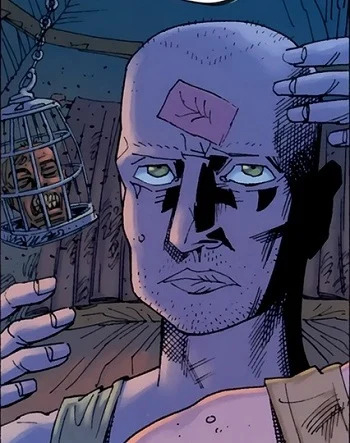
(WARNING! This analysis contains SPOILERS!)
I feel like this one was inevitable. As soon as I decided to bust open the doors on literary mediums like books and comics, this guy was always going to loom over me. Well, let’s just bite the bullet and talk about him.
In the final portion of The League of Extraordinary Gentlemen: Centuries, we are introduced to Oliver Haddo’s ultimate creation… a creation he is incredibly disappointed in. You see, the Antichrist or Moonchild is a whiny, miserable young adult strung out on prescription drugs because he went mad after realizing what he was being manipulated into. He is the subject of derision by all who know him, and is treated like a punching bag by most of the narrative, up to and including God literally telling him he’s a bitch. Our villain here is just a miserable, whiny, kind of misogynistic brat who doesn’t even want to be a villain, and in general is just unpleasant and ineffective save for a school massacre he pulls off.
Oh yeah, and his real name is Harry Potter. Kind of an important detail, that.
Motivation/Goals: So as the antichrist, you’d think Mr. Potter might, you know, maybe want to bring about the end of days and all that. But no! He actually pops pills and isolates himself in Grimmauld Place so that he doesn’t do that! He doesn’t want to be the Antichrist and, really, who would? Most of his screentime is thus spent whining, until he ultimately decides to embrace being the Antichrist because he feels he has no other choice. We’ll get into all of that in a bit, but honestly, his motivation is extremely weak despite the incredibly graphic setup we’re given to his downward spiral: when he first discovered he was being manipulated by Satanists, he went on a magical school shooting, shown to us in a first-person perspective to emulate the games that were often blamed for real school shootings. We get to see Harry slaughter Ron, Hermione, Snape, Dumbledore, and so on, we get to see what he did to Hogsmeade and the Hogwarts Express, and absolutely none of it is pleasant.
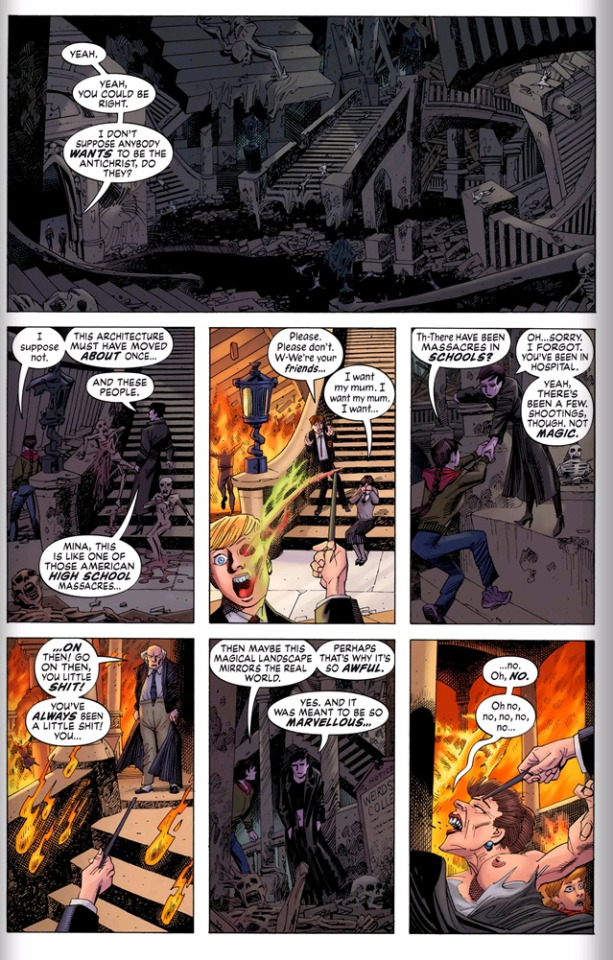
With setup like that you’d expect maybe a little more intrigue and indecision, maybe some sort of conflict between fate and choice or something beyond Harry sitting around half-naked, high off of antidepressants, being a whiny little bitch, but you might be giving the dude who wrote a porno where the kids from Peter Pan engage in underage incest a bit too much credit.
Final Fate: So Harry has gone absolutely bonkers and it seems that nothing can possibly stop him; our heroes seem to be written into a corner. So what does Moore do? He has God - who in this universe is Mary Poppins - descend from the heavens and have her say how she protects the imaginations of children and how she just straight up hates Harry. Never mind that Harry is quite literally an abused child who was twisted by the cruel machinations of a body surfing wizard, apparently he’s a child not worth protecting or caring about and is unworthy of sympathy. Anyway, Mary Poppins just turns him into a chalk drawing and that’s the end of that.
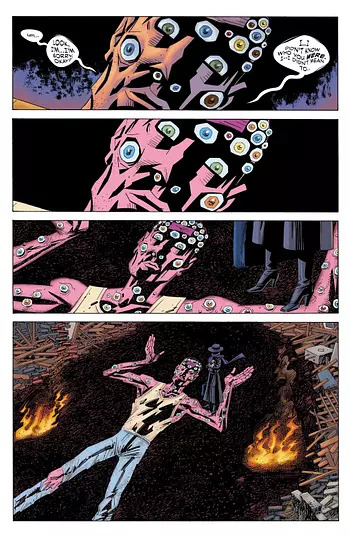
Great writing, Alan Moore, critically acclaimed creator of Watchmen!
Best Scene: Saying Harry here had a ‘best scene’ is seriously pushing it, because literally every moment he’s on the page the comic just beats you over the head with Moore’s biases. I wish I could put the school shooting sequence, because the idea behind it is legitimately intriguing, but the whole sequence is just interwoven with Moore whacking off his hateboner for the series. But on the subject of boners… well, I think there’s only one panel that can truly and adequately sum up this entire character and how much of a miserable failure he is. Those who have followed me for a long time knew this was coming, but for the rest of you, behold - Harry Potter Dick Lightning:
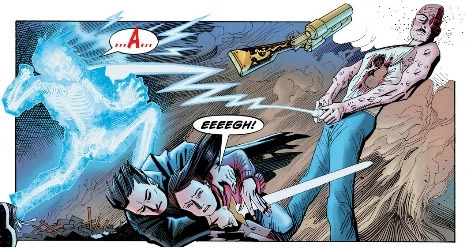
Final Thoughts & Score: Quite frankly, this is the worst thing Alan Moore has ever done.
I’m not even mad as a fan of Harry Potter; Moore was honestly ahead of his time in hating the franchise to this level. The issue I have is that he doesn’t really deconstruct or criticize in any meaningful way, he just is doing edgy “take that” stuff that you’d expect from a chump like Garth Ennis. Like, the concept here is incredibly solid and intriguing - this version of Harry has been groomed from birth by Satanists to become the Antichrist, with all of his adventures fabricated and all of his relationships manufactured to keep him under the illusion he is a hero to mankind. Upon discovering the truth, he snaps, massacres everyone at his school for their role in his manipulations, and went into exile to stave off the apocalypse, although he ultimately and bitterly accepts his role because he feels he was never given a choice… and he wasn’t! He’s an incredibly depressing and miserable deconstruction of the concept of “The Chosen One,” and yet the whole thing falls apart on multiple levels.
The first is that the Harry Potter franchise already deconstructs the concept of “The Chosen One;” the text goes out of its way to point out that Voldemort’s own actions are what is creating a self-fulfilling prophecy by targeting someone with the will and drive to fight back against him. Harry’s not so much chosen by fate so much as forcibly chosen by an evil manipulator… and that’s basically what we have here, but with less substance. Moore doesn’t really comment on anything, instead leading into the second big issue - Harry’s whole role is to be a strawman punching bag villain so that Moore can complain about modern fantasy franchises. Moore seems to view Harry as the epitome of the lazy regurgitation of the same story over and over that modern blockbuster culture so often falls into… except that Harry Potter was an original product developed by one person and had no artificial longevity slapped onto the franchise in the form of unneeded sequels or spinoffs to extend the lifespan of the franchise at the time Moore wrote this. Throw in the fact Moore just in general seems extremely contemptuous of any post-70s pop culture in Centuries and how Harry is ultimately taken down by crusty old characters from older literature really just leads to Moore coming across as a grumpy old man who hates anything new, not helped by his tired criticisms of millennials and their perceived lack of culture. Maybe Moore would have had more of a point if he created this storyline today, but he didn’t. Thus, he has no point and he just looks like a miserable old fart.
Sure, you can argue that maybe Moore’s basic parody of the character by exaggerating his tendencies to their logical extreme and attacking elements of the plot that had been criticized to death by fans to begin with has its place, and perhaps you could even say that the take in the comic is just an extreme take on how Harry acted in the fifth book, what with the lashing out at his friends and his general feeling of a lack of control, and there is some merit to that, or there would be if Moore’s own unrepentant bias didn’t undermine everything. Look, you can hate Harry Potter, but then why slap it into your work? It’s supremely cringey when people insert characters they hate into fanfiction and just completely derail their characters so that they can treat them like garbage with the narrative, and is that not what Moore did here? Is League not just public domain fanfiction? There’s a reason why I coined “Harry Potter Dick Lightning” as a phrase used to showcase a moment where a fanwork’s contempt for a character becomes so extreme that it not only jumps the shark, it rockets over it into the upper atmosphere. Any criticisms or messages Moore is trying to convey is tarnished by his blatant, seething contempt for the character, and that gets in the way of good writing and good storytelling. Having two characters express pity at having to murder an abused child who was warped by Satanists into being a tool of the apocalypse does not make up for how the narrative constantly mocks, belittles, and treats him like garbage to the point he really can’t function as an effective villain that can be taken seriously.
All of this adds up to what I’d argue is the absolute worst villain in all of fiction, bar none. There is just not a single redeeming quality about the Antichrist as a character. None. Nothing. I cannot think of another villain that so completely fails on every single level as this one does. He doesn’t work as an antagonist because most of the bad things he does are offscreen and he doesn’t come into conflict with the heroes until the very end, and most of his screentime features him doing nothing of note. He doesn’t work as a critique, because he is acting as a criticism for things his character never really represented in the first place. He only really functions as the sort of garbage you’d see in My Immortal, where the characters you know and love are turned into evil jerks because the writer hates them - but he even fails at being that, because at least My Immortal is funny about it!
I am going out on a limb and saying that there cannot possibly be a villain that so utterly fails at everything it sets out to be as hard as Harry does. I don’t even want to try and believe it. And so, without hesitation, I am giving Moore’s shallow Potter parody a 0/10. And I pray to Mary Poppins that this is the only one of those I ever dish out, because I really don’t want to imagine what could possibly be worse than Harry Potter Dick Lightning.
#Psycho Analysis#Harry Potter#the league of extraordinary gentlemen#Alan Moore#Centuries#The Antichrist#The Moonchild
27 notes
·
View notes
Text
The Dragon Prince S.3
I have some feelings I need to get off my chest. Warning for spoilers as usual.
I love that the opening sequence is the same as the one from season 1, but from a new perspective. Suddenly that big dark spell Ziard did has a new context, and Sol Regem is the new top-contender for most hatable character.
Yup, definitely the undefeated champion. “Filthy human”, humph.
I do love how Callum thinks in terms of how to unlock more arcanums.
Ok, the silverhenge is a pretty cool location with the illusion and the ritual to get in. And “ghosting” someone is a pretty creative and interesting punishment.
More LGBQT representation AND confirmation that Runaan is alive, sorta. This makes me happy.
“It’s something oddly familliar.....Boomerang?” Ok, this show is a bit too clever for its own good sometimes.
I really love how Callum admits that he still can’t stop hating Avizandum, even as he is looking at his corpse and realizes that this used to be his friend’s dad. That is an impressive level of nuance.
Aaaand with all the positive stuff out of the way...
On a much less happy romantic note: I do not care for the Raylum shipping...at all. I think it has all the tropes of every bland and forced main boy/main girl relationship rolled into one. They have zero in common outside of their mission and all of their romantic moments are literally forced on them. This ritual needs them to hold hands and that plan requires Reyla to wear Callum’s scarf. I just don’t see them having any chemistry once there is peace. They are mainly bonding over how gosh-darn good the other one is and how they keep having to touch each other.
Um, so what was Ezran’s plan exactly? The other kingdoms threaten to go to war so he abdicates the throne and basically lets Viren have the war Ezran originally wanted to prevent? What happened to his positive development from the end of season 2?
I am sad to see that they apparently decided to throw out Viren’s sympathetic angle and go full dictator and gaslighting with him.
On the bright side, I do like that Soren is finally out of the grey zone.
But then it comes at the cost of Claudia moving in the other direction.
And BOY did they double down on the “garden of Eden” theme in the third act. If you thought Sol Regem meant they were going to finally shine a light on Xadia’s bigotry over the humans you are in for a disappointment.
Instead we get Xadia being the underdogs, against an army of humans who are conveniently dehumanized so that we won’t feel bad when they are mowed down by arrows and a character we have gotten to know for a while gets shot in the eye and dies horribly.
What really gets me is the sheer hypocricy of it all. From the very start of the show, they have said over and over again that this was about stopping a war from breaking out. To end the cycle of violence on both sides. I already had a problem with that since Xadia is obviously in a much more powerful position compared to the humans and it makes no sense that humans even could inflict anything on the scale that Xadia did to humanity with just their banishment. But they went so many steps beyond that.
That war they wanted to stop so badly? It came anyway, and our heroes picked a side. Just like they did when the dragon attacked a town full of people last season. And this is apparently a good thing because somehow the country that is the size of all the others combined and has magic coursing through its very dirt, can barely muster up any forces at all and humans are able to walk all over them.
Oh, and remember how everyone was soooo in love with Aanya for being such a wise and peaceful ruler who wouldn’t draw her people into war? Well, turns out she is quite happy to send out her armies, against other humans. But that’s ok, because the humans are literal monsters now.
Not only does the overly optimistic plan to return Zym work, the Dragon Queen seems almost extatic about humans and elves working together. Like she has secretly been wishing for this the entire time. There is no systematic predjudice from anyone in Xadia. Elves are perfectly fine whenever they see Callum and happily break bread with human soldiers after the battle. I guess all it took was for humans to finally redeem themselves in the eyes of their betters.
(Sigh) I am just...so disappointed with this show. It had such an amazing setup that promised to do so many subversive things for a fantasy story. To finally deconstruct the “humans ruin everything” trope or the idea that any power that looks icky must be evil. When I heard about what was going on at Wonderstorm I got worried. Aside from the obvious problems with abuse I feared for the show because they were leaking talent and what we were told about Aaron painted a picture of someone who fundamentally does not understand the dynamics of power and predjudice. Turns out my fears were right on the money.
The Dragon Prince is good for what it is, and the text certainly has more than a few positive themes to it, but the future of the story is up in the air right now and honestly, I’m not sure I want another season. If it comes I will probably watch it, but I would be equally happy if the fanfic community wrote plenty of AUs instead. And I do hope that the fandom remains active.
235 notes
·
View notes
Text
December ‘20
Bugsnax
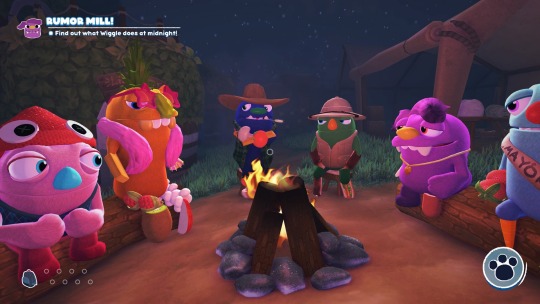
Bugsnax is an odd little title, landing somewhere between Pokémon Snap and Ape Escape. There’s a bit less of a frantic pace though, instead telling a tale of a remote island where the titular part-animal, part-snack race roam about, with a series of characters each having their own relationship to them that... typically involves eating them. The disappearance of one key villager has been the catalyst to everything heading into a state of confusion though, and as the new person in town, it becomes your job to pull everything back together, all while trying to piece together a better understanding of just what Bugsnax are in the first place.
The game’s main cast are loud, colourful, and full of personality, with some decent queer representation going on too. It’s regularly quite charming, but the story runs parallel to a pretty simple gameplay loop of going out to a new area, meeting an estranged villager, getting a new tool that allows you to catch some new ‘snax in service of a given task for said villager, that inevitably fuels their return to the village. While catching a good chunk of the 100-strong Bugsnax portfolio follows a fairly repeatable mould of trap-setting and capture, some require some slightly more creative thinking, and final smattering lean more on good fortune as you try and juggle a few different elements in a way that sets up the perfect snaring.
I’ve seen some talk of folks who found the last sections of the game a little out of character, but having gone through all of the side missions before heading for the finish line, nothing came as too much of a surprise for myself. As a PS5 launch game it might lack the flair and experimentation that one might expect, but in better handling one’s expectations and seeing ‘just’ a game with extraordinary timing, it’s a pleasant and sufficiently entertaining romp - just nothing particularly out of the ordinary.
Demon’s Souls

I was in two minds coming into this. I’ve played the opening few hours of Demon’s Souls about 5 times now, with each attempt before this one stalling at different points for a variety of petty and frustrating reasons. So this, a fresh chance to try again, newly polished and smoothed out, with active servers, and a revitalised community? Excellent! Yet on the other hand, how much of the magic is Bluepoint likely to have been able to recreate? Even as a shot-for-shot remake, what if they had diluted the experience?
While I can’t speak with any particular authority here, very little seems to have changed outside of the visual overhaul. Some areas might be a bit easier to navigate owing to their new lick of paint, but enemies still pose the same threat, and everything is still where it should be, as are the obtuse, woefully under-discussed karmic swings that underpin its tendency system. Let’s not pull punches; it’s most notably a mean platform to build a game upon that makes suffering players suffer more, and is likely not one that you’ll even be aware of it before near irreversible damage is already done. From have undoubtably done similar concepts much better since, and while I might bemoan it, there’s also something to be said for allowing it to still exist just as it did at the series’ outset. It’s likely a wise choice on Bluepoint’s part to have left it untouched, albeit a slightly cruel one.
While the lack of a single, interconnected world was not yet on the cards for this particular Souls outing, there’s still plenty of great level design, with each of the game’s archstones providing a theme that’s adhered to brilliantly. A few exceptions aside, boss battles are typically less about flexing combat chops too, proving more of a challenge in solving how to approach them in the first place. In doing so, it creates some truly memorable moments alongside those that are purely frantic and rewarding thereafter. The same can be said for the game at large too; while its punishment of new players might be its most infamous quality, it does do a remarkable job in having you learn its every inch, and how best to deal with everything it cares to throw at you. While the chase of 1:1 replication might mean some of its jankiness remains, its visual overhaul and silky smooth frame rate certainly do a good job in helping you overlook it all and in embracing the still best-in-class world building. One of the years’ best, and by far the most compelling reason to date for next-gen ownership.
Grindstone
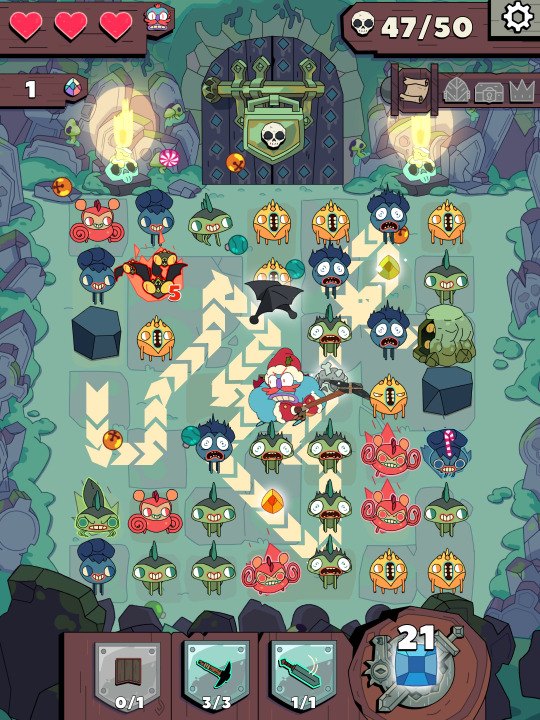
Grindstone was front and centre right as the doors opened on Apple Arcade, and it’s a pretty easy to see why it’d be pegged for such honours. It’s bright, colourful, charming, and very easy to pick up. Some of Capy’s other noteworthy titles might fall more into the realm of the arthouse, but this is them at full power, exhibiting that ultimate strength of knowing just how to capture any given audience. Most of the game is spent planning out your turn, and it looks great even in this calm stillness - but as you unleash the mighty Jorj on each of his rampages, there is a satisfying spring into action that gives the same kind of satisfactory twang you might get from an elastic band, or a coiled slinky about to bound down a flight of stairs.
Within a few short stages almost all of the base mechanics are laid bare, with each turn asking you to plot a course through colour-matched enemies, and landing you far enough away from any enraged enemies that’d seek to do you harm. Chain for long enough and you’ll spawn a grindstone that’ll let you switch colours mid-combo, and building up enough hits can then allow you to expend that strength on monsters with higher health pools. The range of enemy types grows as you progress, as does the array of new tools you can build that allow you new ways of dealing with them all, but ultimately the balance that needs addressing is knowing just when to walk away. There’s typically three goals to each level - opening the exit being just the first of these - and while in some cases you might have a handle on things when the exit does open up, it’s often not the case, and hanging around too long carries the risk of losing all of your progress on the stage if you lose a clear path to your escape.
Some of its later mechanics and the level arrangements can be quite taxing, and while never completely unfair, it can definitely... grind... on your patience. For something that could easily be taken as a casual little puzzle game, it’s quite lengthy too - the path unbroken leads you through a whopping 180 stages, but without extensive draining of resources from each of these, you’ll likely need to try some of the side dungeons to help make your way to the end too. Very likely more than your bargained for then, and yet still plenty compelling to boot.
Necrobarista

Some neatly constructed character models and a snappy trailer might attempt to tell you otherwise, but let us be clear with one another that Necrobarista is very much a visual novel. A shock to the system this may be, but anyone reading this likely knows by now this is far from a bad thing around these parts, so let us look a little closer.
It’s quite a melancholic thing, set in a less than conventional, somewhat Purgatorial coffee shop, where the newly departed stop in for a brief spell and a brew before taking the next step into the great unknown. While there’s a setup here for lots of stories to be told, it really draws in on a small cast of characters who look after the shop, and how a few key visitors change the world built up around them. Between each of the game’s chapters there’s the opportunity to unlock new side stories dependent on which of the phrases you chose to identify with from the chapter just gone, and although short, these do some good work fleshing out some characters and breaking up the main tale. As the title would suggest, the particulars of coffee do come up as a point of conversation, but there’s no drink-making side shows here - just a lot of talking, scheming about how to cheat death, and the more chin-scratching topic of a more accepting approach to this great inevitability.
It’s fairly short - comfortably under 10 hours - but crucially gets plenty of character development from each of its cast given the tight focus. Rather than the still portraits that you might come to expect of the genre, characters are given a real depth with 3D models that convey just as much as their words, which also helps this effort. Perhaps most crucially, and whether it’s in spite of all of the death, or instead because of it, there’s plenty of quite thoughtful and heartfelt sentiment hidden inside it. Comes recommended.
Tangle Tower
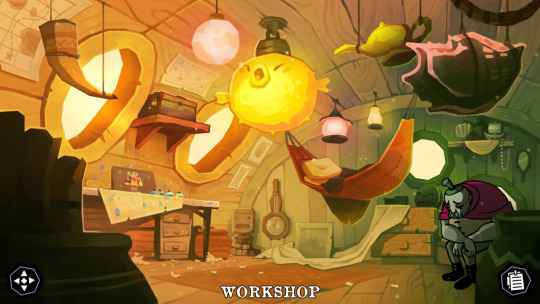
I picked this up for Switch based on a recommendation, not knowing that I’d unknowingly be closing out an Apple Arcade hat trick for the month. So yes, it’s another more story-driven game, not too heavy on the input requirements, but instead good for getting you thinking.
It’s immediately very easy on the eye, with each and every character drawn in large format and animated with buckets of quirk and charm that runneth over. Every single one is brilliantly voiced too, with varying degrees of charisma, bluster, dry wit, and numerous other characteristics that shine through in brilliant harmony with the art. It’s a murder mystery, see, and while you’re putting together what everyone says has happened, looking out for who’s fancying who and the like, you’re also doing so with the critical expectation that at least one person is likely spinning you some tall tales. Luckily you’ll find clues that help you get closer to the truth and help deconstruct some of these falsehoods, whether they’re in plain sight or hidden behind one of many puzzles. These are exemplary in just how well-pitched they come, each being self-contained and just tricky enough to have you pause to really think about them, but without ever being too irksome or troubling to stop you enjoying yourself. Once you do start to get to the point of unmasking some secrets, there’s also a neat little interface the game rolls out for you to drop in and then verify these revelations; pairing numerous characters, items and statements to help demonstrate to it that you’re keeping up with it all, and things are clear enough to move on. There’s subtle little prods in the right direction just when they seem to be needed, further cementing the game’s solid grasp of when it’s best to say something, and when it can let you just stumble about and get on with it.
It’s a fantastic little game. I lost a day or so to this, and had a wonderful time doing so. I hope that it’s not too far away that I forget all of the details, so that I might do it all over again.
5 notes
·
View notes
Text
The Mandalorian Influences
New Post has been published on https://esonetwork.com/the-mandalorian-influences/
The Mandalorian Influences
The Mandalorian has just finished up its second season and I wanted to talk about some of the obvious places where the show has picked up its inspiration. I’m not going to talk about the second season finale because that way lies madness and much exploding of heads.
The Star Wars universe is vast and weighty. It’s become practically byzantine what with the sequels, the prequels, the animated series, the novels, the comic books and all other manner of other spin-off product. The latest of these, in case you’ve been living under a rock and haven’t heard, is Jon Favreau’s live action series for Disney+, The Mandalorian.
The Title character of the series is a mysterious figure. An orphan of war, he has been raised as a Mandalorian, a clan-based cultural group that is composed of members from multiple species all bound by a common culture, creed, and code. They originate from the planet Mandalore in the galaxy’s Outer Rim Territories and are legendary warriors against the Jedi.
Indeed, the Mandalorian follows a strict code, which he justifies with the phrase “This is The Way”
If the setup sounds familiar it’s because the show has been heavily influenced by the so-called “Spaghetti Westerns”, Italian Western films that were produced by Sergio Leone throughout the sixties and seventies. Films like A Fistful of Dollars and The Good, The Bad, and the Ugly.
Favreau is quite candid about that. “I like the image of the Mandalorian because it really hearkened back to the Westerns,” Favreau has said. “It’s a deconstructed version of Clint Eastwood in ‘The Man with No Name.’ That’s a great, mysterious, fun character to see the world through.”
Those films made Clint Eastwood a star and they proved to be huge hits. Although outwardly tales of the American West, Leone’s films were in fact heavily based on the Japanese Samurai pictures of Akira Kurosawa.
But the big plot point of the first and second season was the introduction of “The Child” who is more commonly referred to as “Baby Yoda” because he looks like an infant version of the Jedi Master. The Mandalorian travels the galaxy in his ship with the child in tow. They have a special bond, now. They are, as the Mandalorian puts it, “…a clan of two.”
And this, will be familiar to anyone who is a fan of Japanese comics, or Manga, because of a title called Lone Wolf and Cub.
Lone Wolf and Cub is a Japanese manga created by writer Kazuo Koike and artist Goseki Kojima. First published in 1970 Lone Wolf and Cub chronicles the story of Ogami Ittō, the shōgun’s executioner. Disgraced by false accusations from the Yagyū clan, he is forced to take the path of the assassin. Along with his three-year-old son, Daigorō, they seek revenge on the Yagyū clan and are known as “Lone Wolf and Cub”.
The manga has been adapted into six films, four plays, a television series, and is widely recognized as an important and influential work. One of the works that it has influenced, I believe, is The Mandalorian.
I’m not alone in this. Many others have pointed out the similarities and although Favreau has not been specific about the influence, nor has Dave Filoni, the show’s executive producer, both Favreau and Filoni are clearly familiar with width and breadth of Samurai cinema. Filoni’s work on the earlier animated Star Wars series Rebels and The Clone Wars contain many nods to the samurai film genre.
And, of course, George Lucas has never hidden the fact that he based large portions of the original Star Wars on samurai movies he loved. Specifically, Akira Kurosawa’s The Hidden Fortress. In a 2001 interview for the Criterion Collection’s release of The Hidden Fortress, Lucas makes plain the influence that Kurosawa had upon Star Wars.
Ironically enough Kurosawa was inspired by the Western movies of the American director John Ford. It’s fascinating to think that there is a meandering line of influence that begins with Ford and John Wayne, through Kurosawa, then Sergio Leone and Clint Eastwood to now Star Wars and The Mandalorian.
On a personal note, this is obviously my last post for the year. I’ll see you again in what I think we all hope will be a better New Year.
#Akira Kurosawa#Clint Eastwood#ESO Network#John Ford#Lone Wolf and Cub#Samurai Films#Sergio Leone#Spaghetti Westerns#the mandalorian
2 notes
·
View notes
Note
Qrow not speaking to Ironwood legitimately ruined the series for me. There was just no reason for Qrow not to call, or go behind Ruby's back and talk to him. And this isn't even a shipping complaint. An adult who watches someone who trusts him risk an entire continent on a plan that won't work isn't a good person. Fullstop. Qrow sacrificed Ironwood, Mantle&Atlas to Ruby's fear. Does the show get he (and Ruby) needs a redemption arc? Idek how to redeem people who screw over an entire continent.
Qrow at least wasn’t present during the office scene and has been stuck in jail the rest of the time, so he hasn’t had much power/responsibility when it comes to the fate of Atlas. However, the other side of that coin is that he’s in jail because he teamed up with Tyrian and helped get Clover killed, so…
Honestly, as much as I’ve deconstructed the issues with Ironwood’s arc, Qrow is a character I’m equally disappointed in. He’s a fave of mine in a way Ironwood never was and, crucially, he had some really fantastic setup two volumes back. I didn’t like how they went in positioning him against Ozpin—bypassing compassion entirely to go straight for the punch, especially with Oscar between them—but I could understand it provided that it was leading somewhere. Like my expectation that the group would grapple with their new knowledge of Salem’s immortality, their choice to react how everyone else has in the past, and eventually begin reconciliation with Ozpin, I expected the same for Qrow. Except Qrow also had a complex alcoholism subplot going on, so he was doubly poised for growth. As hard as it was to watch the snow scene and his subsequent fall into more callous, dangerous choices, a part of me viewed it all with excitement to see how the story brought him out of it again.
But that never happened. Qrow did reach a point where the seriousness of their situation outweighed his self-loathing, where he was able to put aside his grief and see things more clearly… but when he did that wisdom was rejected. Rather than re-establishing him as an experienced huntsmen who still has so much to offer the group even while he grapples with his own demons, the “we don’t need adults” scene positions Qrow as someone too jaded to see what’s “really” possible and therefore a nuisance—if not an outright obstacle—to his team. Then the story did it again by having Ruby ignore his pleas to stop fighting Cordovin. Then again when he’s allowed to rejoin them, provided he stops questioning her.
Which finally brings us to Ironwood. The choice to write Qrow as someone who never even considers trusting his long-time ally (what happened to defending him from grimm and asking what the plan is?), to leave the explanations entirely up to his lying niece, to keep silent for weeks—if not months—while insisting Ruby is #different from another long-time ally and friend, to remove him entirely from his family and teammates so as to establish a new relationship with Clover, only to rip that away in part due to Qrow’s choice to fight alongside Tyrian… it’s all horrible. There’s having a character make mistakes and then there’s getting them to a point where they’re swearing oaths to murder their ally as soon as they escape prison, all while ignoring the world-altering war happening outside. Three years in and Qrow hasn’t started pulling himself out of the pit he fell into when he punched Ozpin-Oscar, partly because each time he starts that work, the story insists that’s actually a bad thing. Telling the truth and trying to guide your 17yo niece is bad. Letting your allies explain their side of a situation would be bad. Trusting your new friend over the hot-headed vigilante would be bad. Qrow keeps making mistakes, only now the story is validating them because they’re not mistakes that hinder Ruby. So much of the story now—too much of the story—is driven by Ruby’s perspective. Rather than asking, “What would Qrow Branwen do in this situation?” the show is erasing his base personality to forward the plot. Ruby’s plot. Whether we’re talking about not calling Ironwood, not drinking anymore, or attacking Clover, everything traces back to what Ruby currently believes and what she currently needs the story to do.
37 notes
·
View notes
Text
Reading Len’En Profiles Pt 5
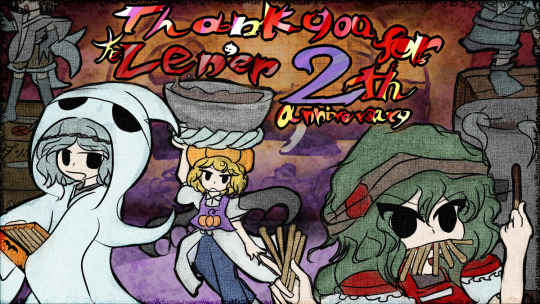
We round off the RMI cast with the New Emperor, their Anachronistic Advisor and the short story detailing how they met. (The illustration above was done up by JynX for Len’En’s 2nd anniversary)
= = =
While Iyozane’s profile is very conventional and barebones, Fumikado’s profile basically has extra details about Iyozane too, which is why I decided to split their profiles off from everyody else.
= = =
How Fumikado and Iyozane Met
I love how half of Fumikado’s backstory is an actual short story. As far as the writing goes, it’s not bad. One issue is how confusing the profile is as a result of all the characters being “they” (e.g. “When Fumikado asked that question, they smiled slightly” is very confusing). Otherwise, I really like how much atmosphere is packed into this little story.
I love how we basically get the full context behind the naming of Iyozane’s musical theme (”In The Gloomy Straits, Steady As She Goes”). We also get a bit of theming with Fumikado in regards to the stars (note that one of Fumikado’s spellcards is constellation)
Oh and the Bridge in BPoHC is alluded to, and Suzumi’s role, and so many other things. It’s crazy how ambitious this profile is. You’d never see ZUN setting up the boss characters of a following game in a profile.
... I can’t believe it took me one short story to instantly want to ship Fumikado and Iyozane. Either I’m getting really soft, or JynX is just way better at creating ‘shipping potential’ than ZUN is
= = =

Stage 3 Boss - Fujiwara no Iyozane
Original Opinion: To me, Iyozane is the weak-link in the “New Emperor Trio”. Their petty ambitions are fine but they really don’t stand out compared to the stoic Tsugumi or the over-the-top Fumikado. It’s a shame too, as I do love their design, their fight and their musical theme (their RMI theme is especialy good. Like, I could listen to that melancholic melody all day~)
Comments on Profile:
I see JynX is just taking the piss out of the species section again (with Iyozane’s race being “Human, aspiring to be a pirate”)
So Iyozane hates the cold too. I find it hilarious that a whole bunch of people involved in this incident actually hate being in the cold (so far, we’re at Iyozane and the two Adagumo siblings).
I relate to their angle of ‘is ambitious, has no clue how to achieve said ambitions’ so much
So Iyozane apparently uses their flute to control the spirits in their spellcards. That’s cool. Especially since their (godly) theme includes a woodwind instrument... I think? I tend to confuse instruments
Does this mean Iyozane is the first musical Len’En character? I feel like they have to be. I do like how JynX avoided the ZUN cliche of “gotta have a spellcard with musical notes, just so you know that they’re a musician!”
I just want it to be know that I totally wrote half of this profile analysis while listening to Iyozane’s theme on loop. It is just so damn good.
Comments on Short Story:
I like the Iyozane portrayed in the short story. Iyozane’s kind of a typical arrogant, villainous noble type in-game but here they seem so full of energy, with how talkative and open they are, how they’re nervous to perform in front of Fumikado etc. While I’m all for Fumikado becoming the new Emperor, I’m a bit bummed out over how boring “Iyozane in active ambition mode” is
I don’t know the full deal with the name “Fujiwara” (other than Fujiwara being the name of some ancient Japanese clan, oh and Mokou having the same surname, of course) but Iyozane gets points for the strangely mysterious backstory
New Opinion: I have mixed feelings here. The short story kind of turned me around on Iyozane, in theory, but I still don’t really like ‘petty advisor’ Iyozane. Until I’ve played BPoHC, I’ll have to hold off on having a final opinion on Iyozane as a whole.
= = =

Stage 6 Boss - Taira no Fumikado
Original Opinion: For all the jokes about Fumikado having a ghost horse stand, Fumikado gives me such strong Joestar vibes. Like, I hear that “Fumikado fought and then ran away from Shion” and my mind instantly goes to Joseph Joestar running away from Straits or Kars. It’s the combination of arrogance, shameless pragmatism and the talent (Fumikado is actually strong... just not “main character” levels of strong). What little I’ve played of BPoHC and their route only cements this Joestar impession I have of Fumikado.
Though I was incredibly disappointed with Fumikado’s badassery and final boss status being deconstructed (seriously, Fumikado would have broken the curse of “lame Len’En final boss” if they’d been played straight), I think JynX has done a good job of transitioning them into something way more enjoyable than *just* a badass final boss... even if that’s more to do with their BPoHC portrayal.
Comments on Profile:
There is strangely zero mention of Taira no Masakado in their profile (despite him being very, very important to Fumikado’s whole deal)
While it was said in-game that they’re supposed to be the vessel for Masakado, I was not expecting Fumikado to have been groomed from such a young age. It’s actually kind of messed up. Especially since you need to ask “what the hell is gonna happen to Fumikado if they’re successful in their goal?”
I also just want to mention the body switching stuff. It is wild that Fumikado can apparently just do that, and that they apparently grew up in somebody else’s body (while somebody else grew up in their body). I don’t write fanfiction but it’d be quite an angle you could explore in fanfic.
Fumikado’s grandpa is like the first canonically male character, right? Not that it matters, he seems like a jerk for convincing kid Fumikado to go through with all this.
Despite my goofy interpretation of them, Fumikado is surprisingly restrained, introspective even, in their short story.
New Opinion: Wow, uh yeah. I think after all of that, Fumikado might straight up be my favourite character in RMI now.
I already liked Fumikado just on a surface level (theme, design, personality) but Fumikado’s profile adds so much pathos to the them. They’re not some failed supervillain. They were someone trained and groomed from birth to do this one role, this one role that could have lead to the erasure of their own existence; and they failed at this one role due to complete bad luck. The irony would be palpable were it not for the fact that they now have a chance to have their own existence, not as Taira no Masakado, but as Taira no Fumikado. Is that not a lot to take in or what?
= = =
Final Thoughts
Though I don’t quite like RMI as a game, I have a lot of respect for it from a writing perspective because holy crap is JynX’s ambition just bleeding through. There’s so many plot threads going on even without adding all the setup and foreshadowing in BPoHC. You got the New Emperor Trio, Tenkai, Yaorochi and Saragimaru’s ‘meeting’ and Shion and Sese’s side stories all packed into one. JynX has set the storytelling bar rather high with this game.
= = =
Ranking the RMI Cast
Taira no Fumikado
Tenkai Zuifeng
Sese
Tsugumi
Shion
My ranking of Iyozane isn’t decided yet. Don’t expect the BPoHC profiles any time soon. Dear God, JynX is a madman for adding two different routes with two completely new sets of bosses and for bringing back every single character.
#len'en#len'en lore#reactivate majestical imperial#len'en project#len'en content#len'en reiretsuden reactivate majestical imperial#taira no fumikado#fujiwara no iyozane#not a reblog
7 notes
·
View notes
Text
white diamond’s morality

i think one of the reasons i like SU so much is, i feel its approach to morality is more structural than individual.
cartoons tend to be a bit... “great man history” about its conflict resolution. that is to say, entire systems hinge on their leaders, and the masses are easily led in a new direction if the old leader is dispatched. this is seen as unproblematic, and no one clings to everything they were taught under the old system. unless, of course, they’re one of the “bad seeds” (note again the individualism) and must also be dispatched, rather than understood as part of a context.
su definitely has a bit of that, namely the gems who were inspired by rose and chose to fight with her, but it’s more deconstructive about it. they all have personal reasons for joining, rather than the rejection of their old lives being the “default”. they still cling to fears of failing to be what they’re supposed to (especially pearl), and their leader doesn’t have a solution to the gem hierarchy.
rose is against it, but she doesn’t know how to dismantle it. she carries seeds of disrespect towards those she protects. she may not even think they can truly break free, judging by her dialogue. she plays the perfect leader, because she’s become depressed enough to think that’s what they want her to be. it’s certainly what she was encouraged to think.
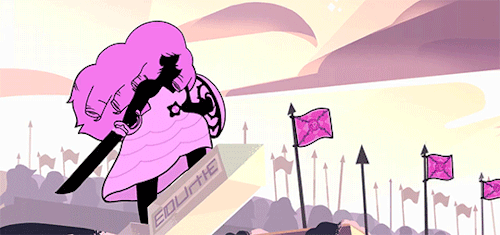
moreover, many on the cg side, including rose, thought that “shattering“ pink would be the end of it. that the dear leader was necessary to keep the system alive. but that thought is subverted - not just by the other diamonds, whose ties to pink are close, but by her followers. the ones whose role became their solace, rather than the thing they wanted to escape from. they don’t all become crystal gems, because that’s not what makes sense to them. what makes sense is to... keep going, as before. that’s what made sense to jasper, eyeball, nephrite.
and yes, they all suffer for it, but the worldbuilding of the show is strong enough that there’s inherent understanding that their responses make sense within their world, and that expecting them to celebrate and change sides overnight is... kind of unfair. it was certainly immature of rose, if she ever had that hope.
which brings me to white diamond.

i love the setup of the current arc. the question is never “can white be redeemed or will we just have to kill her”, because there are actual reasons they’re talking to her in the first place that aren’t merely ideological. like, ok, you defeat white, then what? the corrupted gems are still corrupted. her gems will hate you, maybe even seek revenge. i hope your individual moral purity was worth it, because that’s all you get for refusing to talk to her. by treating her as an individual evil, you’re inherently choosing to ignore structural problems at hand.
so the real questions are as following: 1. what would steven need to do to convince white to help him? 2. why does white perpetuate the system, and what does she think would happen without it?
i’m not the oracle who can tell you the former, but the latter is worth discussing. most of the reaction i’ve seen to the idea of white having genuine character motivation is very... well, as the saying goes, “cool motive, still murder”.
but people basically say that about every character before they know that motivation. they said it about jasper. they said it about blue and yellow (some still do, but others substitute that for blaming everything on white). it’s a very easy thing to say, when you assume all it could be is just “maybe they’re sad and lonely :(“... but that’s not what i imagine for white.
to be clear - i do think she’s lonely. isolating yourself in your head (figuratively and literally) for thousands of years will do that to you... and playing puppet with her pearl is kind of a brilliant commentary on what it’s like to be avoidant - you’re there, you can see and hear others, but you’re shielding yourself in such a way that they can’t really reach you. you’re not present enough to open yourself up, or ever tell anyone how you feel. “white never leaves her own head anymore”.

but this isn’t a motivation in and of itself. avoidance is tied to anxiety, so what is white so scared of happening if she lets go of her control?
honestly, i think what she fears is nothing less than the end of gemkind.
becoming a childless god.
the crystal gems are basically ok with that. they have to be, because gem production requires feeding off of planets, and fertile ones tend to be populated - hence the injectors look like irl viruses. they’re a parasitic species. they reproduce by killing their host.
moreover, gem production is highly specialized. you need kindergarteners, and then you need lapis lazulis to terraform in preparation of the injectors, then of course you need armies to conquer the next planet, and then Of Course you need agates to keep those gems in line, and then Naturally you need a court system with zircons to make sure everyone does their jobs, and Obviously guards to keep the peace, and managers, and pilots, and domestic servants, and if everyone doesn’t do these things then nothing will ever get done! there will be chaos and we’ll be defeated and we’ll all die next time we try to reproduce. what’s that, the youngest diamond thinks we should prioritize humankind over our own species? don’t be absurd!

that’s the rabbit hole of anxiety white has fallen down. and those anxieties aren’t merely hers, but everyone who follows the system - and gems seemingly burst out of the ground “already knowing what they’re supposed to be”, which is very much in line with that system.
we tend to prescribe individuality to the diamonds, that they do things merely because they want to, but i think white is as much part of her court as her court depends on her. she doesn’t just think she’s the leader, she thinks she has to be in order to serve her society. she’s another gear in the clockwork, just like everyone else. why shouldn’t she stay in her room as a perfect queen, shining down on her court without desires of her own? why should she open up about what she wants? such irrational thoughts...
i think how pink creates life (the pebbles, lion, steven’s watermelons) terrifies white, because it’s use of resources without that structure. putting your own desires above your duty, allowing atomic chaos controlled only by each individual, knowing that those individuals could be destroyed and nothing new could be made without a diamond’s essence... feels selfish to her. like. ok, you want individuality and choice, cool, i’m kinda trying to keep everything in its place so we can live on as a species. but go off i guess.
and this is the part where i say what’s obvious but still needs to be said - white’s perspective is flawed. pink may be reckless, selfish, and naive, but white’s system is so deeply collectivist that she fails to see the clockwork as made up of individuals. why shouldn’t she harvest and replace a faulty part, if someone in the beehive isn’t doing their job perfectly? we’re all just machine parts, and we’re all replaceable. naturally. for the greater good.

it’s fitting that what made her smile in the first place was a synchronized dance of literal machine parts. the end of that order terrifies her.
this is why her design (and homeworld’s) is so heavily inspired by the movie “metropolis” - which was in and of itself a critique of the dehumanization of workers under industrialism. white is the end point of that. that’s also where we got the quote for the configuration of the diamond ship - “the mediator between the head (white) and the hands (blue & yellow) must be the heart (steven)”.
but it’s not just her. peridot and jasper both think this is perfectly rational, and write the crystal gems off as emotional and selfish (at first). and.. everything taken into account, it’s clear that neither the crystal gems as a collective or rose as an individual have been able to fully cast these ideas aside. rose’s answer wasn’t for gems - it was to put her faith in humanity, who “can choose”. who can reinvent themselves. and she thought right up until her last years that gems are somewhat tied to their purpose. that’s why she wanted to be human, after all.
and that’s why steven makes such a great bridge between these worlds. he’s blunt about how wrong it is, what rose and the crystal gems thought - that gems couldn’t change. of course they can, look at how far garnet, amethyst, and pearl have come! look at how they’ve blossomed, look at how they’ve worked to become their best selves! look at what gems and humans have in common!

and what’s sometimes a flaw of his - inserting himself into other people’s lives and believing he understands what’s best for them, even before he knows them as individuals, to the point that it occasionally drives people (like lapis and lars) away... who does he have that in common with, if not the diamonds? if not the “impeccable judgement” of white herself?
i think that’s why, ultimately... flawed, biased and shortsighted as he can be (just like his mother), steven can get through to white. maybe not now, but someday. because he understands how these things fit together, how the problems of individuals have structural causes. most importantly, he knows that it’s going to take more than just him to fix things - and maybe he can help white realize that, too. there’s a secret fusion or love affair everywhere you look on homeworld, and so she could never really control a clockwork order... but that’s ok, because she can let go. everything in the world isn’t up to her.
#steven universe#su spoilers#su theory#white diamond#steven#rose quartz#pink diamond#rose diamond#the crystal gems#lapis lazuli#lars
556 notes
·
View notes